Text
Leverage does a phenomenal job with consistent character development across all episodes barring a few exceptions (*cough*French Connection Job*cough*) but they really deserve bonus kudos for Parker. Parker is a stand-out example of good character development without sacrificing the elements of a character that make them great.
Parker starts out as a quirky super thief with an occasional cutthroat lone wolf attitude that seems, frankly, strange in hindsight. Moments in the pilot like drawing a gun and saying “That makes me cry inside my special, angry place” is not Parker language we recognize from her at any other point during the series run. The closest we get is her jaunty “Bye, now!” when she’s a few moments away from throwing Tara Cole off the roof of a building, but that’s still not quite as affected as the “special, angry place” line, which really sounds more like she’s mimicking something she’s seen elsewhere.
And what might have been a scene in which writers new to these characters were trying to find their footing but slipping a bit becomes a moment of genius when you realize that a core aspect of Parker is that she is mimicking the people around her, all the time. She doesn’t have a good enough hold on social norms to respond confidently to situations without using others as a blueprint. We see it constantly throughout the show, where she questions whether something is supposed to be funny, or “hot”, or creepy, and it becomes retroactively clear that her “special, angry place” line is terminology she likely got from someone in her past.
Leverage effortlessly portrayed Parker’s growth as stemming from her exposure to the other members of the team. Sophie is probably her most formal teacher of socialization, since Parker asks her directly about what to do in certain situations. She learns human connection more naturally from Hardison, who also helps by reassuring her that she is not broken, not crazy, and there is nothing fundamentally wrong with her. Parker recognizes an innate goodness in Hardison and tries to mimic it while Sophie gives more specific direction. From Eliot, Parker learns that the things that make her different aren’t necessarily bad and can in fact benefit the rest of the team. And the way Nate affects Parker might be the most interesting, since it’s clear from the start that Parker observes Nate’s methodology and approach to jobs — they collaborate on plans, he tests her, and his influence takes her from the loner she was before meeting the team to the leader of the team when Nate and Sophie retire.
The team members other than Parker are fairly set throughout the original series run. There are moments of growth and learning (Sophie and her sense of identity, Nate and everything going on in his head, Hardison and his strengths/weaknesses and generally growing up, Eliot and wrestling with his past) but they are primarily the same core people from beginning to end.
No one experiences as dramatic a shift as Parker, who goes from being so removed from humanity that she doesn’t understand why anyone would be upset by death/dying, to wanting to understand that concept and throw herself into it, to embracing empathy and understanding around grief especially and kind of becoming a secondary emotional core (Hardison is, of course, the primary emotional core of the group). That's amazing growth, portrayed subtly but consistently over the course of the original series while the writers "show their work" the entire way.
And the best thing is, she never loses her quirkiness. She never becomes less weird or less Parker, she just evolves into a greater version of Parker. That’s the key to excellent character development: leaving room for growth and evolution but sustaining the character in the same way actual people might change and grow but remain, ultimately, themselves. Leverage manages that beautifully and it’s a remarkable, remarkable thing.
#leverage#parker#leverage meta#I wrote this when I should've been working which is why it's a long rambling mess of thoughts#with every leverage rewatch comes meta
374 notes
·
View notes
Text
Knights of Sidonia: Love Woven In the Stars
Sadly, everything I was afraid it was going to be, and a few extras.
Most of the problems come from the fact its THE MOVIE!!!!!!!, though we do have to point out he Funimation dub is, overall, worse than the Netflix one. Most of the time it’s the same, but there’s a lot more of the pukey/cartoony voice acting, rather than proper, dramatic voice acting.
Now onto THE MOVIE!!!!!!!
It compresses an entire season into a single movie, but it’s worse than that. It’s a general audience movie. This means that it spends a lot of time getting the viewer up to speed to where we are in the show. When the exposition happens, 99% of the exposition is stuff we already know, along with the fact it’s a giant infodump.
Space is the best way to describe this. You need space to process information and emotions, and is actually a fundamental part of Japanese aesthetic disciplines. Gone.
Giving a sense of space, both physical and temporal is extremely important in storytelling, which is something that the series did fantastically well. There’s a lot of space in space, and crossing it takes a lot of time. Turning the ship is something that takes minutes to an hour to accomplish safety, and has to be done in stages. The Garde units are designed to spend two months alone in space. Gone.
What should have taken a season is done in a couple hours. What should have taken an episode or two is done in moments. Character development: Gone. Story development: Gone. Emotional impact: Gone. Unpacking the Captain’s character arc is not done. After a sentence or two, it skips ahead to the end of her story, where she is forgiven. Kunato’s redemption arc: done is about 10 seconds. Ochiai’s complex character development: gone, turned into a cartoon villain. Complete with monologue. Complete with monologue in a fight where split seconds determine success and failure.
Every character basically loses 20-30 points of IQ. Camera angles are switched from descriptive angles to narrow / dramatic camera angles. These do help to hide the fact the Garde squadrons rarely if ever use proper tactics. The tactics that the series spent two seasons building up for us. They NEVER engage at maximum range, they never drop the extensions for their rail guns, they take barely minted pilots and instead of putting them in reserve, put them onto the high priority mission. This seems to be a way to introduce the world through their eyes to the virgin audience whom have never seen anything about Sidonia before. Events aren’t carefully thought through, with complex projections, but made with spur-of-the-moment predictions you know will succeed because of plot armour.
10 years have passed since the original, and nothing has changed or been resolved. All of the characters still live in the harem boarding situation. The love triangle is resolved with a last-minute pair the spares hookup that transgenders one of the characters, (and not even the character that is genetically designed to switch genders). The final battle is, quite simply silly, in all regards. This dramatically reduces the impact of it. The happy ending is also a result of brainjacking.
*hits his head on his desk*
Is it a bad movie? No. Would I recommend it to anyone who liked the series? No. Would I recommend it to anyone who hasn’t seen the series? No.
The series is way too complex to reduce down to a single movie, and the backstory infodumps the movie provides don’t happen in a fashion to build dramatic tension. You basically go from: This character with obvious villain / lancer hair is bad. Wait, he’s good now. Oh, it wasn’t ever his fault, so we don’t need to worry about anyone actually forgiving him.
Does it have good representationTM? No.
Do I consider it canon? Parts?, maybe. Otherwise, no.
I’m honestly going to back to wishing we got a third season.
6 notes
·
View notes
Text
Editor’s Note: TV moves on, but we haven’t. In our feature series It Still Stings, we relive emotional TV moments that we just can’t get over. You know the ones, where months, years, or even decades later, it still provokes a reaction? We’re here for you. We rant because we love. Or, once loved. And obviously, when discussing finales in particular, there will be spoilers:
There was a time when Veronica Mars’ legacy was that of a beloved cult show that was canceled too soon by network executives who didn’t understand it. With the arrival of a crowd-funded feature film in 2014, its legacy evolved as one of the first shows to see the benefits of a revival. Now, it simply brings thoughts of sadness, rage, and betrayal.
When Hulu first announced it was reviving the series for an eight-episode fourth season, the news was met with resounding joy from a vocal and passionate fanbase that had never given up hope it would return after the crowd-funded feature film reunited Kristen Bell’s Veronica, a pint-sized private eye with a sharp mind and even sharper wit, with her one true love, the reformed bad boy Logan Echolls (Jason Dohring). But the fire that had burned for more than a decade and twice-revived the show was suddenly extinguished in a single, heartbreaking, and wholly unnecessary moment when Logan was killed by a bomb left in Veronica’s car shortly after the couple exchanged wedding vows.
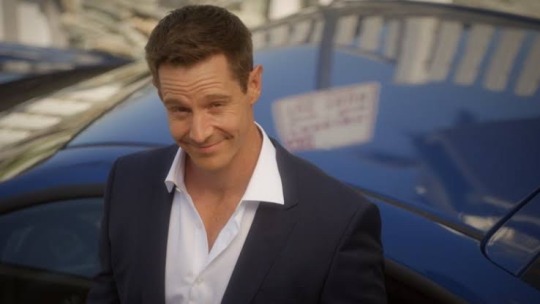
I can still remember the shock I felt when I reached the end of the screeners Hulu sent. The whole thing felt kind of surreal, like if I didn’t acknowledge what had happened out loud maybe it didn’t actually happen. But it did happen. And I’m still filled with a fiery rage and a deep sadness when I think about it now, nearly two years removed from the episode in question, because needlessly killing Logan was a betrayal of the worst kind. The character’s untimely demise felt engineered for nothing more than shock value, like it existed only to leave Veronica even more isolated and cynical. But the interviews that series creator Rob Thomas gave in the aftermath, in which he tried to defend the decision, revealed something much worse while only driving the knife he’d stuck in fans’ backs deeper.
“In order for us to keep doing these, I think it needs to become a detective show—a noir, mystery, detective show—and those elements of teenage soap need to be behind us,” Thomas told TV Guide of the decision to kill Logan, noting that he also hoped to take Veronica out of Neptune and on the road in potential future seasons. “I sort of viewed these eight episodes as a bridge to what Veronica Mars might be moving forward.”
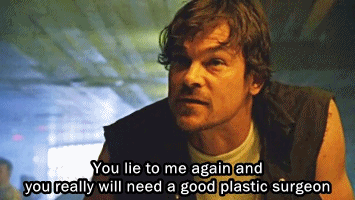
Instead of being a bridge to the future, it was a bridge to a grave of Thomas’ own making. Not since How I Met Your Mother ignored literal years of character development to deliver a half-cooked series finale the creators had come up with several years prior has a show felt so out of touch with its characters, the story it was telling, and its fans. Thomas’ decision to kill Logan is the perfect example of a creator being unable to recognize their own biases to the detriment of their creation.
He wrongly believed that Veronica needed to be hardened by years of nonstop torment and trauma in order to prove she was a great detective whose story was worth continuing. In putting her through the emotional wringer (again) after spending the entire season attempting to dig into her flaws and determine the root of her problems, Thomas swiftly undermined his heroine and her trauma with one misguided act of devastating violence. The fact that Thomas then chose to also skip over Veronica’s grieving process entirely reveals how little he ultimately thought of Logan or Veronica’s relationship with him, which had pushed her to be better and work through her longtime trust issues.
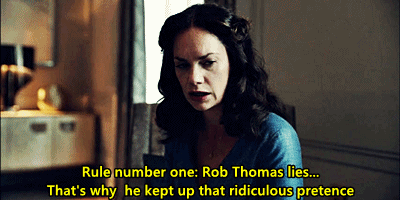
It is common knowledge by now that Logan was not intended to be Veronica’s love interest when the show debuted, but the fans took to the character more than they took to Teddy Dunn’s Duncan “He Used to Be My Boyfriend” Kane, so the latter was jettisoned from the show after Season 2. And in the end, Logan turned out to be a much better partner and match for Veronica’s personality. So what’s truly unfortunate about Thomas killing Logan, and killing him so violently, is that his thought process during Season 4 has the potential to color everything that happened in the show up until the moment the bomb went off. There is also the issue that Thomas apparently believed that Veronica achieving some level of romantic happiness was a one-way ticket to the grave, as if shows like Friday Night Lights hadn’t already soundly debunked the myth that happy couples did not make great TV.
Obviously an emotional family drama does not play by the same rules as noir, but Veronica Mars had already proven that you don’t need to play firmly within the sandbox of the genre to excel creatively. So why should the more adult version of the show attempt to put itself back in the box to be confined to something more traditional or stereotypical? Furthermore, love and contentment are not character flaws or weaknesses. They are not an element of “teenage soap,” as Thomas put it. In fact, one could argue that by allowing herself to believe that she and Logan could have a happy future together regardless of everything she’d witnessed in her line of work, Veronica had shown more personal and emotional growth in the show’s fourth season than she had in the entire run of the series.
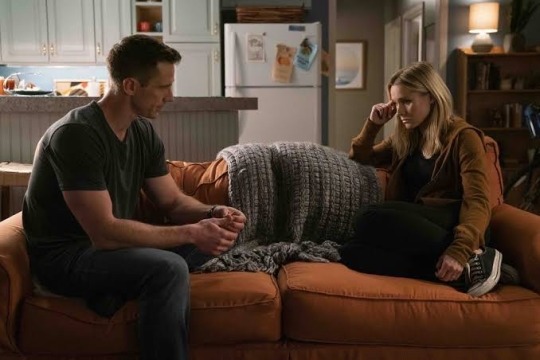
At the heart of the matter, though, is one simple, glaring truth: Logan’s death was a fundamental misreading of the entire Veronica Mars fandom and what they liked about the show. Storytelling should never be dictated by the fans and their desires—one of the loudest and most common complaints critics had about the movie was that it felt too much like Thomas was just giving the fans what they wanted rather than attempting to tell a good story—but when your fandom has dug their hands into the cold soil of the TV graveyard to raise your show from the dead, you should probably have a grasp on what exactly the fans like about it in the first place. After all, they’re the reason you still exist and will be one of the final arbiters of whether or not you get to continue to exist in the future. And the idea that fans would somehow be interested in watching a version of Veronica Mars in which Veronica was on the road, completely alone, and Logan was blown to bits is just a wild miscalculation.
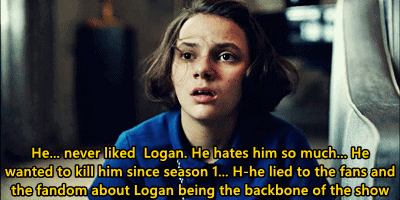
This isn’t to suggest Veronica Mars could not ever survive without Logan. That would be to undercut the rest of the show and the woman Veronica has become since we first saw her cutting Wallace (Percy Daggs III) off the flagpole in the series’ pilot. But there is a difference in writing Logan out of the show’s ongoing story arc—his secretive Naval career offered the perfect out—and violently killing him in an attempt to shock viewers and show just how resilient your heroine is in the face of trauma. A survivor of rape who had to solve the murder of her best friend (Amanda Seyfried) while still in high school because the sheriff’s department was too inept to do it (or simply did not care to do it), Veronica had already been through more in her young life than anyone should ever have to live through.
Although Logan’s death led to her finally seeing a therapist, it seemed to be a one-time thing, so nothing has really changed. Veronica is still the same person she was before the show returned, except now she’s also a widow and Thomas has alienated an entire fanbase to the point that many fans, though likely not all, have no interest in revisiting her story. And they’re not likely to either, since Hulu chose not to move forward with another season.
So much for that bridge to the future.
#Veronica Mars#Rob Thomas#Jason Dohring#Logan Echolls#VMars#season four#news#roast that bitch motherfuckers
76 notes
·
View notes
Note
So, thoughts on Superman and Lois now that the Season is over?
Anonymous asked: So what do you think of Superman & Lois S1 now that the finale is out? Hopes for S2?
Anonymous asked: Superman and Lois season 1?
Anonymous asked: Any thoughts on the Superman & Lois finale + season one as a whole?
Anonymous asked: Thoughts on Superman & Lois Season 1? Any hopes for next season?
Anonymous asked: Haven't seen anything from you regarding the S&L season finale yet-- Thoughts on the ep/a season overview?
And then there were none. Not much to say about the finale itself beyond that I thought it was probably the best episode since the pilot at threading the various needles in play in capturing what works about the show, and I liked that the cliffhanger managed both a mandatory "ooooooo, it's a refereeennnncceeee" while really more importantly being about a shakeup to the family dynamic. As for the season as a whole I'll go into the pluses and minuses below, while noting the one really big 'minus' upfront that remains why all other considerations aside I'm not going to say 'you should totally watch this show!' until or unless at minimum Todd Helbing exits the production, preferably with a clear sign of 'hands off' regarding Geoff Johns as well.
The Good
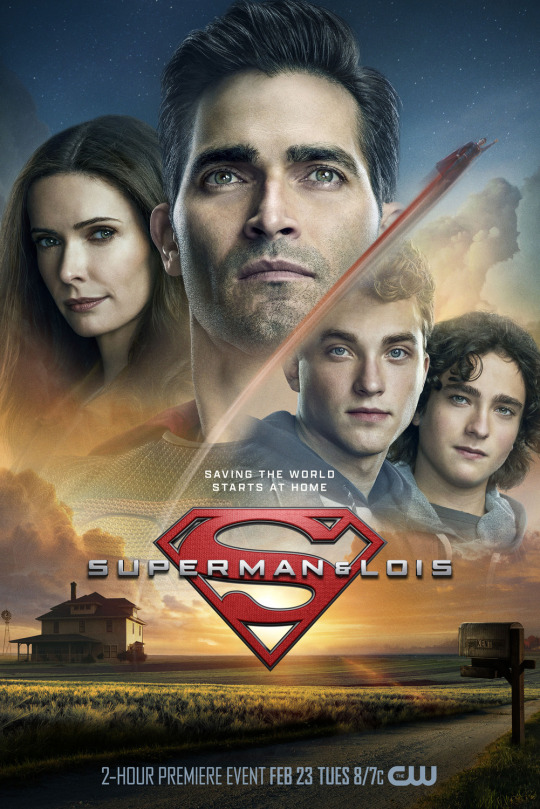
The Cast
This was what had me rooting for this show's existence years before it was a glimmer in the CW's eye - while he can't fully keep up the same overwhelming intensity of Superman-ness across a weekly TV show rather than bi-annual guest appearances, this did nothing whatsoever to abate my conviction that Tyler Hoechlin is flat out the best live-action Clark Kent of all time. Dude just fundamentally gets it right down to the core, with a scope and range to what he successfully does with the character that his peers simply can't match. What was a revelation over time for me was Lois and the kids: I liked Elizabeth Tulloch a lot from day one but the layers she got to peel back over the course of the season (helped by the flashback episode, which landed a little colder for me than most but did a lot to illuminate her performance by contrast with her playing 'classic' Lois) genuinely got me to rethink how I consider the character, and Garfin and Elsass took what could have been the blandest if not actively irritating stock roles in the boys and managed to imbue an earnestness and vulnerability simply above and beyond what the scripts offered them. The Cushing-Langs largely land to an extent I never would have expected going in, Wole Parks wrings every atom of pathos out of Steel he can, and Adam Rayner once he fully emerges as a threat feels like he's coming from an entirely different kind of sci-fi show in the best way. When the material sags the way it was a given it would coming in as a CW production, the folks in front of the cameras stepped up.
Relative production value
Not a ton to say here, but dang, this looked pretty good? There was a clear difference in which episodes had real $$$ to play with and directors who got this was going for something fundamentally different than The Flash vs. which didn't, but even its cheapo moments at least had clever superpower setpieces and solidly charged action beats to offer.
Commitment to its deal
Probably the most important aspect in terms of it hanging together: it largely followed through on the vision it established for itself. With its aesthetic, with its family drama engine as driven by the two best people (if not necessarily always best parents) in the world regularly shaking up the status quo, with solid, grounded emotional moments of grace we've never seen realized onscreen before like this for these folks and real swings for the fences with the mythology. For all its stumbles it established a strong identity among its peers, and its one that should be able to carry it forward a good long ways.
The Bad
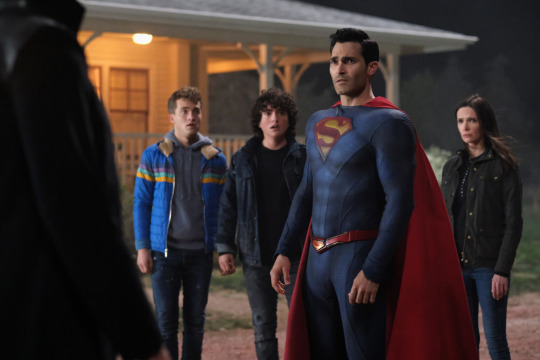
Even a Superman can only carry so much
One of the first things I said when the series was announced was that it should initially keep fairly streamlined, and I wasn't proven wrong. Even with the additional ordered episodes (which themselves hurt more than they helped, as they were much more padding for time rather than diving into the nooks and crannies of the setup), this simply wasn't a show that could juggle the 6 interfamily relationships AND the fall and rise of Lana's family AND Smallville's socioeconomic decline AND parallel Earth drama that wound up intertwined with both the superhero and family threads AND Superman's secret evil brother AND a coming of age narrative revolving around the formation of a first relationship (with a mental illness aspect that very frustratingly went nowhere) AND the kids fitting in at school AND Superman's tenuous relationship with the powers-that-be AND his struggle to juggle his commitments AND Lois rebuilding her life in a new town as she battles the corporatization of reporting. That'd be a lot for a best-of-all-possible-worlds Superman show to handle. This? I clearly liked a lot about it, but nuh-uh.
Is He His Brother's Keeper?
A friend of mine speculated from pretty early on in the season that this was initially pitched as a one-child show, with the boy who would've been Jonathan turned into Jordan when higher-ups refused the idea of a Kent Family show entirely about Lois and Clark's relationship with their 'troubled' son; as a result the version of Jonathan we got was either created from scratch or retooled from a best friend character to serve as the picture-perfect Son of Superman, to establish his brand in that regard if they ever wanna make a movie or cartoon about him. When the showrunner is talking in interviews about how next season they'll start to delve into 'what he wants', it's hard to deny that however exactly things shook out behind the scenes (though at this point I'm REALLY leaning towards my friends' theory) he was very much an after-the-fact consideration. I'm not personally affronted in the sense of it doing a character I like dirty - whatever they were named both boys were clearly a conglomerate of a lot of different takes on the idea of what Lois and Clark having kids could look like, going back long before 2015 - but damn, you wrote this really kindhearted kid played with a lot of warmth by Elsass and you put him through the wringer on every level for 15 episodes in order to facilitate stories and realizations for everybody else, and that's just not narratively satisfying.
Where's the Romance?
I don't mean the love between Lois and Clark - the show did a quality job there on the foundation of Hoechlin and Tulloch's chemistry. But I mean capital-r Romance in the classical sense. It could sure tap into it when it wanted to with its tableaus of Superman's big saves, him and Lois kissing as they float across the horizon, the Kansas or Arctic landscapes, the odd really lovely mid-fight framing. But as much as this wants to be a 'grounded' show, it was more focused when it chose to puncture that bubble on odd bits of Lore (The photonucleic effect! Bishop Six! X-Kryptonite!) than really expanding that framing outwards, and that's when it felt most like a stock CW superhero show with a few more bucks to throw around than something unique among its kind. That mystique and wonder is something Superman thrives on, and I think a lot of the show's problems and shortcomings (especially with flailing with how to handle a non-super kid in a captivating way) had this at the root. Hopefully this is one of the post-season one course-corrections sure to be made: even if it probably didn't consciously register with many I doubt it's a coincidence that the moment in the pilot the internet exploded over didn't just have him in the Fleischer suit, but was the most technicolor, dreamily unreal moment the show has had to offer thus far.
Now what?
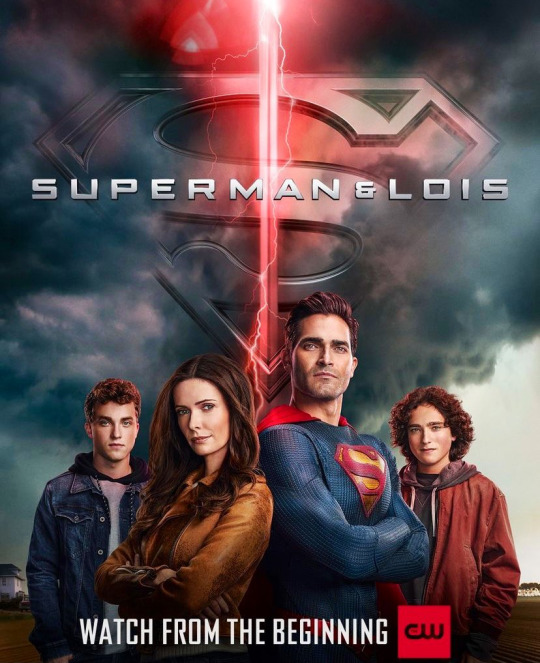
So thus far, about as much a mix of good and bad as could've been expected from the outset of the premise of 'a bunch of really good actors are gonna make a CW Superman show'. As for where to go from here:
* In an ideal world, this would be moved to HBO Max with a new showrunner so it could spread its wings and ditch its baggage; this feels exponentially less likely with the Val-Zod show in production there, but I know this is doing way better in streaming than it does airing live so I can dream. In any case, it needs to commit harder to stylization with whatever resources they do have.
* Give Jon powers, at least by the end of the second season. I get the 'one son with powers, one without' dynamic should in theory have legs, and it'd be harder to manufacture drama for him once he's that impossibly well-adjusted AND can toss a truck like a baseball, but as-is this just isn't working and this isn't the kind of show that can do 'what if you were an ordinary kid but your dad was SUPERMAN' with whimsy and excitement rather than it being a drag. Give the powers some complications compared to Jordan's for awhile and you're good.
* I'd say 'give Superman his real clothes' but I'm like 90% certain they've known that they'd be doing that with season two since 10 minutes into the broadcast of the pilot.
* Glad to hear they'll be using more, smaller villains next time around; even if they're rightly sure to have Brainiac as a big bad at some point I still hope they'll be willing to just go 'and this week he fights Parasite!' every now and again. Hold off on Cryer a little longer though since Luthor hung over the first half of season one. And we'll probably see that alt-Earth possessed Superman sooner rather than later, which is fine.
* They sorta teased the notion of a new DEO head but drop that altogether, the show had to stretch to make Superman working with the military remotely palatable as-is and I wouldn't say it fully succeeded, just run with Sam Lane trying to be a family man.
* Long-term, I know what I'd want them to do with the final season, but before then at some point: bring in Kal Kent! He's buck-wild, he's easy to do on a budget since he'd rapidly lose his powers if he was stranded in the 21st century, and he ties directly into the big ideas of the series.
* Oh and Routh's gonna show up at some point, right? Hand to GOD they're gonna bring in Routh again at some point.
15 notes
·
View notes
Text
Dean’s Body as a Punching Bag
Ever since I made this post about Sam and (his lack of) bodily autonomy (as well as the follow-up post that carries the theme through the other 10 seasons), I’ve been trying to determine what the corollary for Dean is. Re-watching 5x01 made it jump out at me in a huge way:
The bodies of the people that Dean loves are consistently used in a way that hurts/harms Dean and metes out violence against him. And it is specifically his loved ones’ bodies themselves, not shapeshifters or lookalikes or Leviathan either. It is the people he loves’ hands and fists and weapons.
(I need a snappier way to word that, but bear with me).
Where Sam’s bodily autonomy violations occur before he’s born, and are seen as early as the pilot with Azazel in his room and with the Woman in White, Dean’s analogous theme doesn’t sneak in until the mid-season finale with Asylum.
In this episode, Sam gets infected with a sort of ghost-possession/ghost-sickness (another example of a violation of his bodily autonomy) and his internal anger becomes external, focused on Dean. Sam attacks Dean violently, and Dean goes so far as to hand over a (thankfully unloaded) gun and in this altered state, Sam actually tries to shoot him.
Ouch. The person Dean loves and most wants to protect had his body violated and used against Dean. This theme is going to carry us through the next, eh, 10 or so seasons, with some tail-end examples even after that.
In Season 1 we have Asylum mid-season, and we have the finale in which John is possessed by Azazel and hurts Dean most grievously, almost kills him. In Season 2, Sam is possessed by Meg and shoots Dean (in the arm). In Season 3, we had a writers’ strike and a season cut short so I can’t think of any examples there (but lots of other shit to unpack for another day).
The in Season 4, we have Sex and Violence, which is super interesting. While Dean is the one targeted by the siren and therefore the one whose body is used against his brother to hurt him, the actual violence doesn’t start until Sam is also infected. Sam’s body is violated by being held at knifepoint by his brother and his mouth forced open to accept the siren’s venom, but then it’s a fist-fight, a showdown. Both brothers’ bodies being used to hurt the other, but getting to that point required Sam’s body to similarly be ready to be used against Dean.
Season 5 is literally bookended by instances of this happening. First, true to the idea that Dean sees Bobby as family, Bobby becomes possessed by a demon and he violently attacks Dean. And then Swan Song, most famous example by a huge margin, Sam is possessed by Lucifer and is fist-fighting Dean, destroying his face and killing him with his fists, and it is his overwhelming love for Dean that allows him to overcome this possession and save the world.
The theme is carried forward for a few more seasons, pretty much until that narrative turning point in Season 10 that I mentioned in my post about Sam. In Season 6, soulless!Sam allows Dean to be hurt by a monster, harming him by proxy. In season 7, Sam is hallucinating and almost shoots Dean. In season 8, Cass is programmed by Naomi to kill Dean, and in the episode Goodbye Stranger beats him to a pulp before overcoming this programming. In season 9, when Gadreel reveals himself and takes over Sam’s body and kills Kevin, he also attacks Dean.
Skipping Season 10 for a hot sec (more on that below), Lucifer also later possesses Cass in Season 11 and harms both Sam and Dean. In Season 12, we get brainwashed Mary attacking her sons (and overcoming possession thanks to Dean). And possibly examples from S13-15 that I’m missing (Garth being affected by Michael? Cass being affected by Rowena’s spell? Both Sam and Dean were affected by the Witch from Wizard of Oz, right? I honestly can’t recall the late seasons near so well). But regardless we see the theme play out in the final 5 seasons, just less and a bit different than it had prior.
-
Now, let’s unpack the S10 shift a bit, and why it changes things for this theme of Dean’s.
In S9, Dean takes on the Mark of Cain under the weight of guilt and self-loathing from having violated Sam’s bodily autonomy by tricking him into being possessed by an angel (and forcibly having him possessed by a demon to then fix that angelic possession). In this instance, Dean is willfully taking on something that alters his own body, and the narrative between he and Sam is flipped. Now Dean is the one with something ‘evil’ marring his body and impacting it outside his control, and now Sam is the one who is ignoring Dean’s protests and autonomy in order to save him from this thing, consequences be damned.
That 2.5 season role-reversal arc was huge for how it changed Sam’s storyline for the final 5 seasons, and similarly huge for how it impacts Dean’s.
Dean is now the one whose body is being used as a weapon against those he loves most, and he is the one suffering that loss of autonomy and control over himself. He is sick with bloodlust, is turned into a demon, is drawn to the First Blade, and is not in full control of himself. When the Darkness is unleashed and Dean suffers the emotional consequences of feeling tied to and drawn to this monster (woman? celestial being? godlike person?) against his will.
The Mark/Darkness narrative shows us that Dean’s body might belong to him, but it too can be corrupted against his will. Dean learns that he won’t always be able to choose, learns what it means not to have control over his own body. That while he puts his family as his duty above all else, while he would sacrifice literally everything (his body, his soul, the entire universe) for his little brother, the opposite might also be true, even if Dean doesn’t want it to be.
(And I said elsewhere that I fundamentally believe this narrative role-reversal was a consequence of him overstepping his ownership over Sam by tricking him into taking Gadreel. Their positions are swapped because they have to be, because narratively it becomes necessary for Dean to know what this loss of autonomy feels like, and for Sam to override his brother’s choices, or else they may never find a sense of equilibrium again).
By the time this Mark/Darkness narrative wraps up, Dean is fundamentally, irrevocably changed. Where in Season 5 it was completely unthinkable that he would agree to be a vessel for Michael, it is in the finale of Season 13, just two seasons after the Darkness storyline wraps up, that we see him take Michael into himself as a snap, in-the-moment decision. What was previously unthinkable is now canon.
Because Dean is now different. Because his core of protecting Sam is the same, but his theme of how others' bodies are used against him has now upended itself, and he now has had his body used against others.
In my post about Sam, I said that in the end for the final seasons, the narrative has shifted from Dean owning Sam’s body to Sam also owning his own, and them acknowledging that they are in this together as a result of Season 10. I believe that happens with Dean as well, owing to this reversal. Sam has now taken some ownership over Dean’s body by getting rid of the Mark, and Dean has relinquished some of his tight-fisted control over himself.
So Sam is sharing ownership over his body with Dean (in the vein of “I can’t pretend you won’t do whatever you can to keep me alive, even if I don’t want it, but we’re in this together” and “if we die we do that together too”), and Dean is also sharing ownership over his body with Sam (in the vein of “I’m no longer convinced you’re going to abandon me, so the things that I will do to keep you by my side will be met equal between us” and “when it comes to keeping you safe, it’s my autonomy I will give up first, not yours”).
-
But what does this particular form of bodily-violence-from-family say about Dean from a thematic standpoint?
In my post about Sam, I talked about how the themes of possession (ghost and demon) and demon blood are inherently about bodily autonomy and free will.
For Dean, thinking through this theme of his loved ones being used to hurt him, I’m torn trying to find the way to word it, but I feel that it has to do with his themes of self-effacement as love, as protection and duty. It’s about being willing to suffer anything (even to the point of death) to protect his family, the ones he loves most. Family is the end-all-be-all to Dean, and protecting his family (most especially his little brother) is the core and heart of his character. It is a duty and a responsibility and a calling and a purpose.
To remix a quote from the film Legend, Dean’s devotion to his brother (and to a lesser extent, to everyone else he calls family) is how he measures himself. There’s no single word for it, as it’s a mix of protection as love, as an instinct, but also as a fundamental duty, an identity. His internal compass.
So Dean’s narrative invokes free will in a very different way than Sam’s. Dean always had and has free will. He had the will to sell his soul, the will to refuse Michael. He has autonomy over his body and he has choice, so much so that he makes choices over and over for Sam. Instead, Dean’s struggles with autonomy of self as related to his constant effacement (to the point of complete ego-destruction and physical loss of self) for the people he loves. He will die, sell his soul, let himself be beat to a pulp, and anything more that the situation calls for, so long as it means protecting or not harming his loved ones.
The original Swan Song end is a tragedy of Shakespearean proportions, in the style of Greek tragedy. Sam’s struggle for autonomy, and the moment he claims that autonomy for himself, he falls into the Pit for eternity. Dean’s original intended Swan Song ending is analogous: a struggle to exist as more than his duty to his family, and right after he accepts that Sam is allowed to choose Lucifer and death for himself while Dean may continue on living, he then chooses to fall into the Pit after his brother so they could be together (in Hell, in the Cage) eternally.
Both of them have these absolute tragic flaws and in the first Kripke-era arc, tragic sacrificial ends. Sam’s relating to will and autonomy, Dean’s relating to love, family and protection/duty. Both of them belonging to themselves and to each other.
-
-
A few extra things about this theme worth noting:
1. the people who love Dean are always in an altered state when they harm him, whether it be possession, brain-washing, siren venom, soulless, etc etc, which I think goes to show in some ways how this love as a given to people who will never deliberately harm him.
2. in a huge proportion of these instances, Dean is saved by the person who loves him reclaiming themselves over and above their altered state. John overcomes Azazel’s possession (arguably, I would say, deliberately from Azazel, but let’s not quibble). Bobby stabs himself in the stomach to save Dean. Cass overcomes Naomi’s brainwashing. Sam overcomes the literal Devil possessing him. Mary overcomes some brainwashing (I think?). Etc. So Dean's love as sacrifice is rewarded?
3. Sam’s body is the most frequently used to harm Dean.
#supernatural#supernatural meta#spn#spn meta#dean winchester#dean winchester meta#oof#i made myself sad#i gotta stop thinking too much about these damn brothers#long post#long post for ts#violence tw#abuse tw#family violence tw#in a weird way#ask to tag#apologies for typos this got away from me
89 notes
·
View notes
Text
FFVII: REMAKE Exists to Mock Your Pain
This is a post about Aerith Gainsborough.
If you are wondering, this is not a post about shipping. It is also very long.
I do talk about the love triangle from a narrative construction and game design standpoint, though. If that interests you, go ahead. If not, scroll on.
+++ Open Spoilers for FFVII (1997) and FFVII: REMAKE +++
So, my reading of FFVII’s infamous Love Triangle has always been that, in the text, there, uh…
Isn't one.
Not really.
The structure of the entire narrative and the trajectory of Cloud's and Tifa's character arcs are built around the two of them baring their vulnerabilities at each other in a rare moment of acceptance, connection, and understanding. You might argue that we never see them physically intimate, here them say those three little words, or even engage in a few PDAs, that the nature of their relationship isn’t clear.
But to be honest?
Who cares that we don’t?
Something we can learn from Good Omens is that, if two characters have to kiss or fuck or say ‘I love you’ to convince you that they’re head over heels for each other, the story is either poorly written or you don’t really understand the meaning of the word.
I have a higher opinion of this game than that, and I want to have a high opinion of you, gentle reader.
The Lifestream Sequence is the emotional climax of the game’s narrative. The rest is simply clean up and denouement. However, that fact does beg the question: "What then, is the narrative purpose of Aerith's attraction to Cloud?"
To start, it's not a connection to Zack Fair, given that in the OG he's more plot device than person. So, what is it then?
I'd argue, that through a combination of incident and design, the Triangle exists at the crux of two competing narrative threads, held in tension by the fact that, as an audience, we share our perspective with the POV character, Cloud in this instance, and the plot works through him to us, most of the time. These two narrative threads are:
Establishing and foreshadowing Cloud's romantic feelings for Tifa as present and important to him and his character.
Getting the audience, not Cloud, to fall in love with Aerith Gainsborough.
If you’ll allow me to put my Doylist hat on for a moment, I have some trivia for you.
As an interesting hiccup of human psychology, the wad of soggy bacon that is your brain is incapable of distinguishing, on an emotional level, between real people and fictional ones. This is why you can start to feel like, after watching the same streamer or listening to the same podcast for long enough, you might start to feel like the hosts are your friends, even if you logically know that isn't true. It is the fundamental psychological reason fiction can resonate with us, despite us knowing it’s, fundamentally, an entertaining lie. Video games, as an interactive medium, can dig into this phenomenon like no other form of storytelling. With Aerith, you might have spent 20 to 30 hours with her by the time you get to the Forgotten Capital. You’ve laughed and fought and maybe cried with her across two continents and a trio of plot arcs. She’s a person the audience has, via Cloud, shared a whirlwind, globe-spanning adventure.
The reason that its her death, out of all the other fictional deaths we’ve experienced, out of all the deaths within FFVII itself, that hurts the most, is because that, by the time she leaves the Temple of the Ancients on her own, she doesn’t just feel like Cloud’s friend.
Its over just when she feels like she’s become yours.
Not content to simply to explore the grieving process of its own characters, FFVII reaches out to take something from you, and have you grieve with them.
A recurring and oft-pointed-out design decision is the empty space left by Aerith after she dies. Holes in group formations, gaps in menus, etc. Places where she used to be. A reminder of the loss, or more optimistically, a commentary on how she’s still with the party in spirit.
I would argue that it might just as easily be you in that space. AVALANCHE is a rag-tag group of misfits bound together by their grief, and when you leave the Forgotten Capital, you’ve been blooded. You’re trauma-bonded to the group now, and you’re all there, shoulder-to-shoulder to do right by your fallen friend.
It’s a gimmick that appears on the ludic level as well. Cloud’s various panic attacks, out-of-body experiences, and struggles for control are experienced by the audience through the mechanics. Sephiroth manipulates Cloud by disrupting, blocking, and limiting your connection to him. he isn’t just denying Cloud agency, he’s reaching out through the fourth wall to deny you your own.
To personally victimize you.
Once you leave the Forgotten Capital, the dialogue choices vanish. You are no longer Cloud’s co-pilot. The trauma and grief has severed that connection you had with him. You can’t do anything to help or guide him anymore. He’s on his own and you, along with Tifa, have to watch him slip out of your grasp and into the hands of an enemy all three of you are powerless to fight.
Final Fantasy VII isn’t a video game.
Final Fantasy VII is an elaborate mouse trap masquerading as a late-90′s JRPG, and Aerith Gainsborough, part-time human, full-time hello kitty monster truck, is an insidiously crafted piece of fine Swiss Gouda. It is designed, from script to visuals to music, to fill your heart to bursting and then run it over with a sixteen-wheeler; then leave you reeling for long enough that you don’t hear the tell-tale crunch of rubber-on-asphalt as it backs up over your pulped torso for good measure.
Which brings us to REMAKE. Namely, why did they cut a lot of scenes from the OG’s script that heavily featured Aerith flirting with Cloud? Or suggested there might be something there, between them, to the audience? It’s for the same reason that Sephiroth no longer has his trademark slow-burn rise to the center of the stage.
Those plot points no longer served their narrative purpose.
REMAKE is, functionally, a pseudo-sequel. A retelling that exists in conversation with a past version of itself, and is constructed with the assumption that the audience is, at least passingly, familiar with its legacy.
Sephiroth doesn’t get a mysterious build-up because everyone already knows who he is and what he’s about, he and Aerith are familiar with at least a broad-strokes version of the script because the audience already knows it by heart, Cloud gets headache flashbacks of scenes from the OG when we see something we know will be picked up down the line, and Aerith isn’t pushed as hard as a love interest to the audience because we’re already attached to her at the hip.
Aerith seemingly knows about her fate, and while the game leans heavily on suggesting Tifa and Cloud’s shared romantic feelings, even moreso than the original did in this segment, it still holds space for Cloud to pursue Aerith, should you choose. However, she all but talks past him and directly to the audience in her Chapter 14 Resolution scene, warning us away and signposting an oncoming tragedy so that we might brace for it when the time comes and spare us any unnecessary pain.
Her character development gets fast tracked too, through knowledge granted from the Arbiters, she grows quickly towards her late-disk-one identity as the Last Ancient. She gets a piece of the closure with Zack she might get at the Gold Saucer on her date with Cloud, a chance to say goodbye to the last bit of her normal life before she was able to fully embrace the fact that it was gone. She even gets the closing speech this time, last words usually reserved for the protagonist.
But that’s what she is at the end of REMAKE, isn’t it? The only one on the same playing field as Sephiroth and the only one who might be on the same page as the audience. Equal parts the Aerith that just left Midgar and the Aerith that we saw leave for the Forgotten Capital back in 1997, on a mission to protect her friends from the danger that lay on the path she knew she had to walk.
All of us now get to walk that path on more time.
Maybe this time we’ll get to walk it with her. Maybe this time we’ll get that happy ending. Hell, maybe Zack makes it out fine too and we get that heartfelt reunion our hearts bled for when finished Crisis Core. Maybe yours is still bleeding.
Maybe, maybe, maybe.
The Arbiters subplot exists to taunt us with these possibilities, to roll back our grief from acceptance to bargaining to denial, if we ever reached those stages to begin with. I can almost see our girl getting to go home this time, safe and happy and surrounded by her newfound misfit family, free of the crippling loneliness that’s haunted her entire life.
But to be honest?
All I can see is a better mouse trap.
#ffvii#ffvii remake#spoilers#aerith gainsborough#cloud strife#tifa lockhart#sephiroth#good omens#analysis#love triangle#love triangle debate#cloti#zack fair#long post is long#arbiters of fate#game design#narrative construction#note to self: stop using meth
192 notes
·
View notes
Text
Thoughts journal Ninjago season 13!! 🖤🖤 (4/4)
Here we are, at the end of just another season of Ninjago! And I've gotta say, until now it has been very good, I think I'm liking this season better than Prime Empire and Secrets of the Forbidden Spinjitzu. I liked them too, but this one feels more complete and deep, also LILLY GOT A BACKSTORY HECK YEAH 😍😍
Prime Empire had one really great ending, so I'm very curious how this season will conclude! Spinjitzu burst? Some last minute plot twist? Cole and Vania confirmed...? 🙄
Here we go!!
THE DARKEST HOUR
So I'm guessing the guys aren't doing too good at the moment 😅
I know this is kind of a tense situation, but honestly Kai looking so confused at having to lead cracks me up 😂 "Do I have to say it? Is that what being in charge means?"
Lloyd: YOU
Jay: SHALL
Kai: NOT
Zane: BE GRANTED THE PERMISSION TO TRAVERSE BEYOND THIS POINT
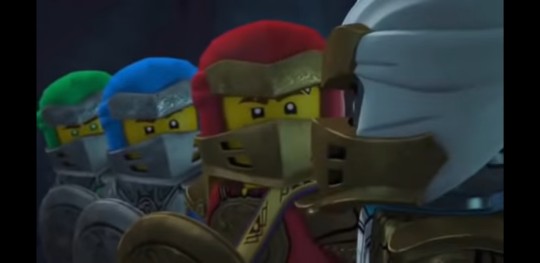
I have no words, that was such an obvious reference in full Zane style so in character, I have tears. Beautiful 🤣🤣
Also they all look SO COOL 💚💙❤🤍
My ninja babies fighting together screaming NINJA-GOO!! Really this season feels like we're back in the old days, so cool! And they are so in sync, Kai lifting Lloyd up and Zane pushing others away and I LOVE THE FIGHTING ANIMATIONS 🤩
Poor Skull dude, he's trying to do his big bad guy monologue and he keeps getting interrupted 😂
It was cute that both tribes immediately refused to surrender, not sure if it was for pride or they actually care about their new ninja friends, but it was nice
Aahh, near death life experiences, the best way to elicit teamwork 👍 Nice scene, nice cute scene
Nnnnnyyyggg, Lloyd, that's the sacrifice look right there 😱 At least they just turned themselves in peacefully after reuniting the tribes... aaand of course he was lying, I hate that Skull dude 👿👿
THE ASCENT
Back to team Cole! Back to the Upply! 🖤 Quick guys, we're only three episodes left!! NEED TO GO BIG!!
Heeeeeyy, Wu back in business! I kinda missed him a bit taking control of the situation, it used to be him because he was the master. It really is a jump into the past this season! 🤩🤩
Sure let's go with the explosive cart, not like Cole and the other ninja haven't been piloting a falling apart rocket back to Earth before 🤷♀️
A Mech on rolleskates, why not? Does Cole even know how to go on those though? He was already out of the Tournament of Elements during Chen's Thunder Blade so I don't really know...
Lolz the monster was actually waiting staring at the wall, guess you don't get much fun in this mine 😅
COOL FIGHTING SEQUENCE COOL FIGHTING SEQUENCE COOL FIGHTING SEQUENCE 🖤🖤🖤
And a poor old couple of civilians traumatized. They need to be trained by the people of Ninjago City on how to deal with weird appearances 💪
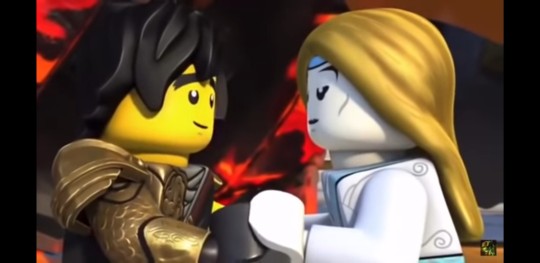
I guess we're doing this 😅 Gonna be honest, this is the first very evident sweet look I see from these two. I like Vania, a lot, but another classic love interest? Uuuuhhh, Idk, Imma see the rest of the season and see what happens 🤷♀️
A baby dragon on a giant spider, one of my favorite things ever on one thing I fear... I'll let it pass just because Adam is a good boy 🕷🕷🕷
GO VANIA GO GIRL LET HIM KNOW WHO IS THE BOSS HERE!!! 💛💛💛
THE UPPLY STRIKES BACK!
I really like these DnD guys, they've grown on me, let's see what they have in store! 😁
Munce and Geckles under chains, ninja in a cage, the Skull dude has the control, we're back when we started... sucks to be a ninja sometimes 😅
Omg I'm loving that this dude is trying so hard to be menacing and he keeps getting ignored 😂😂 Aww cute, you think you're the first that wants to destroy the ninja? Such a special little snowflake 😘 Evil monologue, we've been going for 13 seasons now with various specials and a movie, we heard it already 🤷♀️
Also the reveal, and he's all "Your friend Cole is dead" and Lloyd "That's what they all say, buddy" ��👌
Poor Cole just wants justice for his mom HELP EMOTIONAL AGAIN
I'm all for Cole's personal team, they should do missions together, like Jay's team in Skybound!... that technically never happened, BUT STILL COOL 🖤💙🖤💙
Oh boy oh boy oh boy got the swords, confrontation ready, BRING IT!! Ninja team is all in for this!! ❤💚💙🤍🌊
REVOLUTION!!!! 💪💪💪💪
Swords aren't usually Cole's weapon of choice... BUT DANG IT HE CAN SWING THEM, HOLY GARMADON!!! THIS IS THE FIGHTING SCENES I WANT!!! 😍😍
How is this the episode prior the finale? It already feels like the finale! What else is going to happen?
SON'S OF LILY
Oh with a title like this, it's a given that I will not survive. Oh boy, here goes, the FINALE!
Chaos, chaos, beautiful dragon of death and distraction, also gently reminder that Mino is also a very good boy 💕 Are the skeletons connected to the skull? Are they gonna stop reform when Cole defeats the Skull Sorcerer?
The swords are not actually magical? Huh, first weapon in this show that turns out to be a fluke, apart maybe the Dragon Armor of the Firstborne... that one stayed intact at least 😅
HERE COMES THE VALKIRIES!!! *classic related music plays*
THIS. FIGHTING. SCENES. ARE. SO. FREAKING. GOOD 😍 Also wow sensei, full kamikaze with a dragon? I guess the sacrifice gene really runs into that family 😅
COLE NO DON'T HURT ROCK BABY 😭
"Always." KIRBY STOP MAKING ME CRY WITH YOUR AMAZING VOICE ACTING SKILLS ALSO HOLY HOOLA GANG
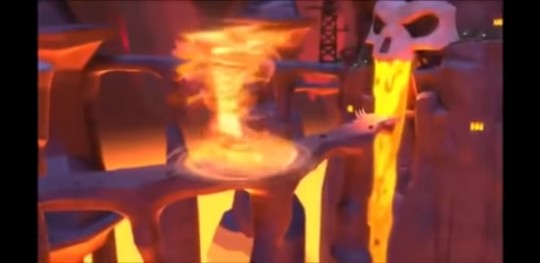
THAT'S LIKE A SPINJITZU WITH THE TRUE POTENTIAL OMG HECK YEAH SHINE COLE SHINE!!! 🖤🖤🖤
A bit red, could mistake it for Kai's, but it's an orange earth lava burst so I understand
Cole: okay guys, done my part
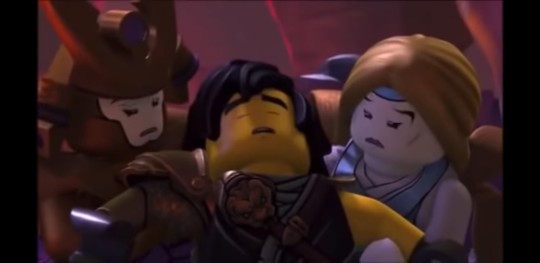
Cole: wake me up when next season is out
LOOK AT VANIA BECOMING THE QUEEN WITH THAT BEAUTIFUL ATTIRE AND USING COLE'S MOTHER QUOTE BECAUSE SHE LEARNED SO MUCH FROM COLE AWWW 💛
Okay, since there weren't evident references to Nexo Knights this season, can I pretend Fungus shooting fireworks is one? Merlok used to do that almost at every season finale... IMMA PRETEND 🙃
She is so adorable, I really love her. Wished we've seen more of her bond with her father, it felt a little easy her giving up on him. Idk, Sky and Chen didn't have that much of a bond but she struggled a lot! But she is super cool and cute, I ADORE her 💕
This sounds like a pretty good experience for Lloyd who FINALLY spent a season without being scarred for life!!! He even met a princess who didn't plan his death!!! Montgomery things are getting better 💚
Well, that surprised me, I guess Cole and Vania like each other but not heavily? Just a very light mood, like they care a lot but no other step further. I'm very happy about this choice, you can see it as a couple if you want, but you can also say they are just good friends. Nice 👍
Oh no, Wu got his midlife crisis, SOMEBODY STOPS HIM 😱
Wherever the wind will take them okay, wherever the producers will decide to torture them 😗
Overall, great finale! 😁
FINAL THOUGHTS
I think I enjoyed Prime Empire's finale more than this one, but this season with all of its episodes was absolutely AMAZING 🖤
The Skull Sorcerer wasn't necessarily a bad villain, but the story kinda went into another direction in my opinion so his part wasn't fundamental. Which isn't a bad thing for me, it's actually new and exciting see the attention to the story instead of the villain, and I did enjoy how they made fun of how cliche he was being 😂
Vania was GREAT. Wished we had more time with her father to really establish what kind of bond they had, but overall I loved her, new best girl acquired 💛💛💛
FREAKING ROCK MOM!! FREAKING LILLY!! I'm so emotional just thinking about this family, omg, THIS is the content I want for Ninjago! Impactful, that makes sense, connected to the heart that makes you so much closer to a character! Finally the Rock family is getting more complex 🖤
I think this season really gave Cole justice, we got her mom's story, we've got him leading a team again, we've got him with a cool new power! 😍😍
For the other ninja it was okay, I really liked the shenanigans with the tribes and the cultures were really fun to explore. Was kinda like a side quest and for me didn't bring that much to the main story, but it was fun and it's fair, Cole had all the attention he deserved 👌
FIGHTING ANIMATION OMG HECK FREAKING YEAH 10/NINJA-GOOOO ❤💚💙🖤🤍🌊
Beautiful designs for the characters, in particular the Shintaro citizens, and also wonderful backgrounds and sceneries, that I thought were starting to lack but here seems much nicer to look at 🤩
What can I say? Ninjago still knows how to mess with my heart, and I'm so very happy about it. I think the so wanted Cole season was definitely worth it 🖤🖤🖤
Now, I heard voices about a possible Nya season... ABSOLUTELY YES, YES TO EVERYTHING, QUEEN GETTING HER OWN SEASON YES YES YES!!! 😍😍😍🌊🌊🌊 Besides that apparently Maya will come back, which is a dream coming true, if they give Nya the same attention they gave to Cole this season, I will be happy 😊
#i am so happy#ninjago outdid itself#really#the cole season#worth the wait#lego ninjago#ninjago#ninjago cole#cole brookstone#ninjago kai#kai smith#ninjago nya#nya smith#ninjago jay#jay walker#ninjago zane#zane julien#ninjago lloyd garmadon#lloyd montgomery garmadon#lloyd garmadon#ninjago vania#princess vania#ninjago spoilers#spoilers#ninjago season 13#ninjago master of the mountain#ninjago wu#sensei wu
68 notes
·
View notes
Text
Touch Them, Talk to Them: Villaneve & Nuance in Villanelle's Psychopathy (2x07)
okay there is SO much to say about 2x07, but none of you want to read 10k words of analysis, so im going to pick one topic and stick to it (for now). in this post, im going to talk about how this episode is – I believe – a response to: a) villanelle’s season 1 claim that what she wants is, among other things, “someone to watch movies with”, b) eve’s question, “you really don’t feel anything?”, and c) martin’s assertion that to psychopaths, there are only “i / it” relationships. i think aaron is a fantastic opposite/parallel to villanelle, because i believe that a great antagonist doesn’t just provide practical obstacles in the plot-path of the protagonist, but removes obstacles in their character-path. an example of what i meant by this is that in season 1, villanelle killed bill, killed frank, ruined evidence, impeded the investigation, and messed eve around (obstructing her plot-path). but she also drove eve to confront the (sociopathic) personality traits that she’d been repressing, and helped eve find her sense of purpose, confidence and power (smoothing her character-path). in season 2, however, villanelle has been shifted from an ~antagonist~ (ostensibly, as she doesn’t fully conform to this reductive role) to a protagonist, and aaron replaces her as the mysterious Other. just as we had with eve/villanelle, he is both Like and Not-Like villanelle. it’s the likeness that makes him an interesting (and dangerous) opponent for her, but it’s the not-likeness that’s so significant.
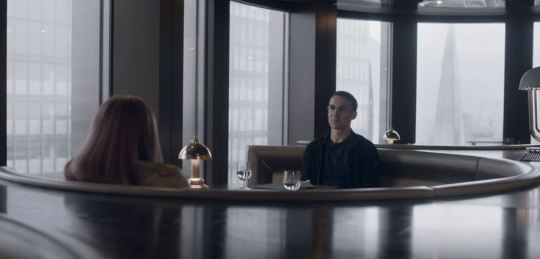
in 2x06, villanelle has her iconic “boredom” speech, and monologues about how nothing makes her feel anything. so at the start of 2x07, eve asks her if that’s all true – although it seemed authentic, it’s fair enough of eve to ask, considering how often and easily villanelle lies while playing her characters, and that villanelle prompts her (“you’ll feel better if you talk about it”). villanelle’s reply is that she doesn’t actually KNOW if she’s telling the truth or not. i don’t think she’s deflecting here; she appears subtly, but genuinely, torn. she DOESN’T know.
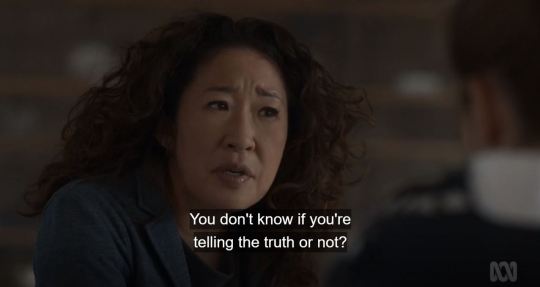
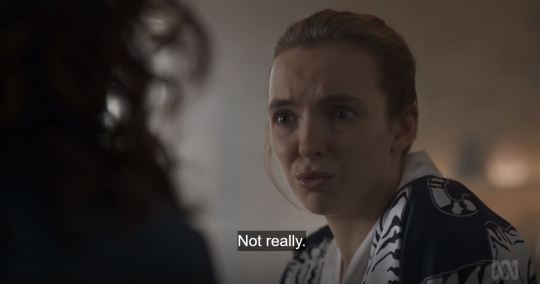
she wants to give eve a real answer, but she can’t. this is probably the result of a whole lot of mixed information: she’s obviously been told she’s a psychopath (by lawyers and therapists and fellow prisoners and konstantin, then eve), and she knows she enjoys killing people, controlling them, and she is often bored, too, like she said, but none of those things feels like enough. so she offers eve the most she can give: “i feel things when i’m with you.” and while she definitely means this – we could’ve guessed it, considering the lengths she’ll go to to even end up in the same country as eve – she’s still conflicted.
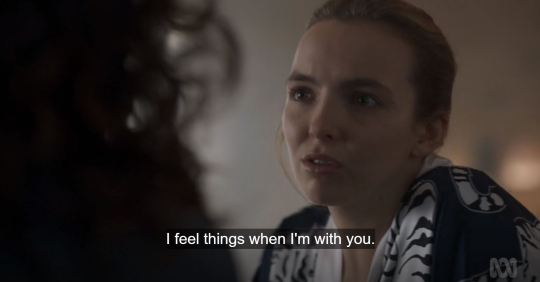
so then, in the last quarter of 2x07, we get this scene between villanelle and aaron:
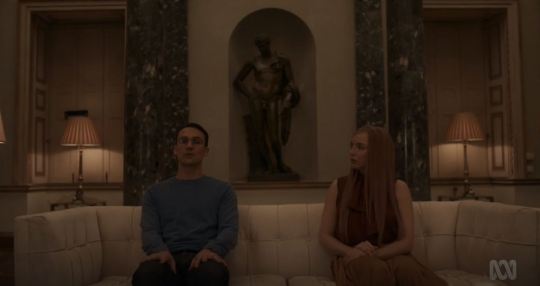
he describes them as “voids”, and villanelle doesn’t hesitate before agreeing. she’s a psychopath, right? she must be a void. she’s not “nice and normal”. she doesn’t mind stabbing or suffocating or toying with other people. between her and aaron, there’s this heartbeat of dissonant kinship. she’s already joked that they might be “soulmates”, so here, she’s just chatting with him. she’s certain they’re fundamentally the same, and there’s not much to be learned from this, so she’s mostly humouring him. so she asks something out of mild interest, but she thinks she already knows the answer.
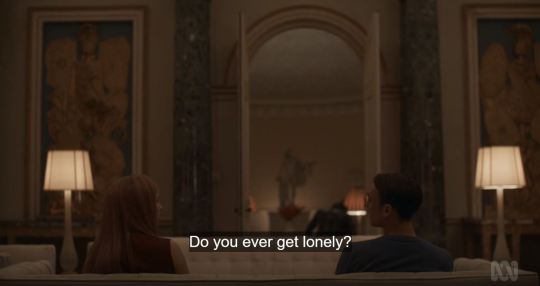
“do you ever get lonely?” villanelle does. she finds being cooped up by herself to be tedious, and uses the time to prepare her next interactions – elaborately faking her death for konstantin; planning new presents or tricks or reminders for eve. importantly, in defiance of the “incapable of ‘i / you’ relationships” idea, she is able to apply this notion of isolation to eve. in 2x06, she tells konstantin she’s texting eve “because [eve] might be lonely”. sure, villanelle primarily wants to know how much of an impact she had by killing someone right in front of eve, but she’s not really lying; she can follow and understand the emotional process of “niko left - today’s been a high-stakes day - eve is alone - eve might want somebody to decompress with”. and she feels compelled to offer eve that, to make things better for her. but:
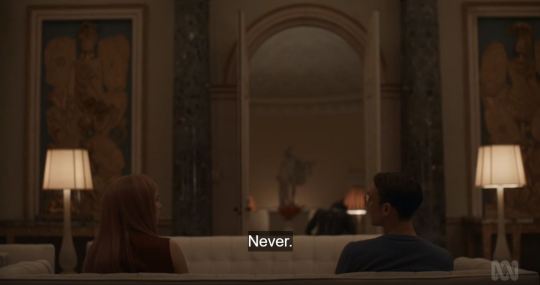
like i said, villanelle has been trying to reach out on the common ground she percieves them as having. she expects to relate to aaron in every way, because he’s a psychopath, too. except aaron goes on about how he knows so much about people, how he observes them. villanelle often does this as well – stalking eve in clothing stores back in season 1, googling her, watching through her windows, etc. but that’s not even near to enough of eve for villanelle, so her reaction is one of confusion. “you don’t want to talk to them? touch them? sleep with them?"
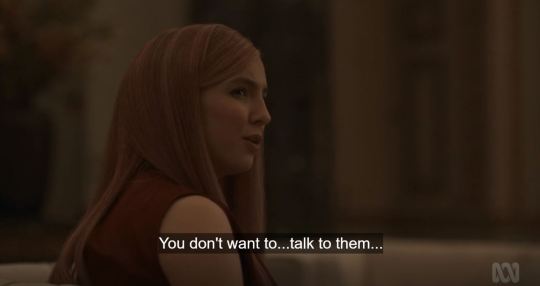
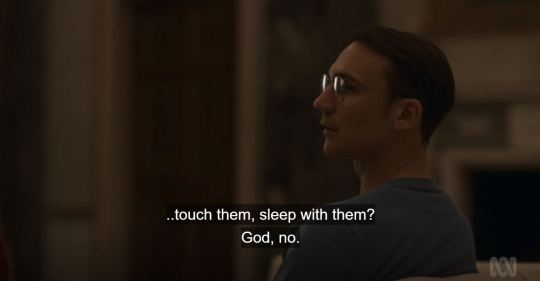
"god, no.” aaron’s inflection is almost one of disgust, and definitely one of superiority. it’s like she’s asked him if he’s interested in hanging out with rocks. he can’t imagine having any involvement behind mild amusement at the opportunity to manipulate people, like toys. “do you?” he asks.
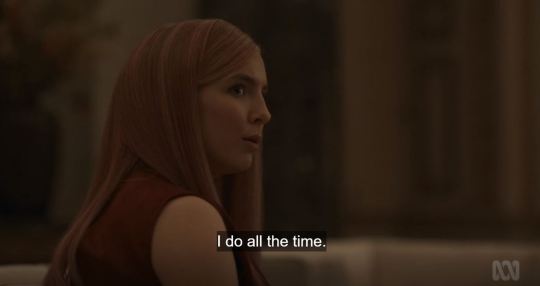
“yeah! i do. all the time.” it’s an immediate knee-jerk response, and though it’s soft, it’s emphatic. villanelle doesn’t doubt her answer. as the shot pans out, she gives a slight gasp, and almost smiles (mirroring that slight smile through her sobs in amsterdam). aaron remains impassive.
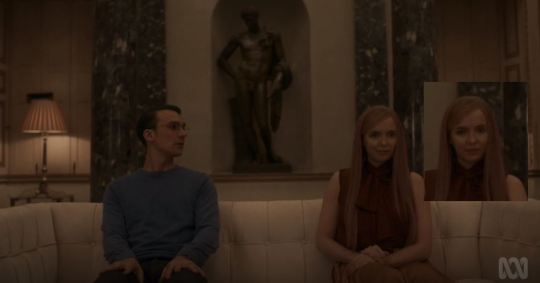
i believe that this exchange is maybe the MOST important of the episode, second only to eve/villanelle’s semi-sex scene. i also believe that it’s this conversation with aaron that leads villanelle to breaching that last unspoken barrier between her and eve. to be clear, i’m not trying to say villanelle isn’t a psychopath. one revelation does not fifty people un-kill. just a handful of hours before this moment, she murdered gemma with a plastic bag. so i’m not suggesting villanelle is just like any of us. she’s not, eve’s not, and we don’t want them to be. my point is that this moment clarifies a lot for villanelle. she’s been trying to figure out her own capacity for emotion and connection. one thing that she’s considered a fact about herself since before the pilot is that she “wants someone to watch movies with”. she expresses this desire to eve and konstantin with no hesitation; she’s sure, and this becomes a tacit premise in a lot of her reasoning over the whole show. i suspect villanelle doesn’t have any long-term understanding of what that really means, but she wants it anyway. she also plans most of her life around being able to get closer to eve, whether by teasing her or helping her or steering those in eve’s life to create the required conditions for a confrontation.
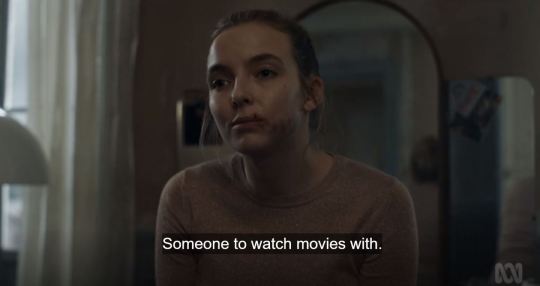
which is why aaron telling her he has NO need for human contact is such a big deal. because villanelle obviously DOES. she needs it, she wants it, she always has. anna, eve; villanelle develops romances that run deep – even though she’s no longer obsessed with anna by season 1, she still clearly feels a connection to her, and i don’t think she’d have killed her if anna hadn’t killed herself. then there’s konstantin, and she’s a little shit to him, but she definitely missed him, if the way she ran into his arms in 2x03 after being forced to put up with raymond for ten minutes is any indication. villanelle and konstantin have a rapport, and they trust each other (in that they both know each other well enough to guess when they might betray each other, and can account for it accordingly). essentially, until now, villanelle has been running with the equation “aaron = psychopath; me = psychopath; thus, aaron = me”. she’d assumed that part of psychopathy was just the level of human interest she has – which is why she doesn’t have an issue telling eve “like us, you mean”, even though eve has a long-term relationship and friends: that amount of involvement is still realistic for them, right? but aaron doesn’t have this need for people. so now, “aaron =/= me” for villanelle.
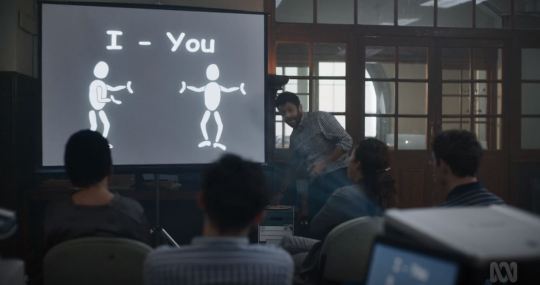
crucially, this interaction gives villanelle CONTEXT. rather than dealing in absolutes, she now has a spectrum of psychopathy: “aaron –> me –> eve –> carolyn –> konstantin –> etc.” aaron has inadvertently told her that what she feels is real. maybe she’d almost believed that, seeing as psychopaths can’t feel anything, can only have the “i / it”, that what she experienced was an infatuation or illusion (although this was shaken by eve stabbing her and by crying in amsterdam); but here’s aaron confirming that the idea of fascination with/caring for people has never even occurred to him. and it does NOTHING BUT occur to villanelle. eve runs circles around her head.

let’s look at that in practice. aaron’s most significant relationship is with his sister, who he treats like crap. he’s got her babysat, won’t listen to her opinions (“the grownups are talking, amber”), disrespects a friend she likes, calls her a “thickie”. then villanelle, the closest thing he has to a friend – he watches her without her consent, plays dress-up and stay-still like she’s a doll, tells her what she’s going to do (“spit it out”) and instructs her on how she should feel (“you’ll be bored”). but villanelle? her most important relationship is with eve. and sure, she makes really fucked up choices, but she also makes an effort to consider how eve might feel, what eve might want, what might appeal to her. AND, she’s IMPROVED at that. for example, in 1x03, she kills bill to get eve’s attention, but it’s at the price of hurting her. by 2x07, though, villanelle won’t kill niko. it’s mostly selfish – she doesn’t want eve to be mad at her – but if it were aaron, he’d try and force eve to be un-mad somehow, with money or threats, etc. (not that aaron would bother; he wouldn’t mind if she hated him) villanelle, though, she wants eve to ACTUALLY love her, not to HAVE to love her. villanelle is manipulative, obviously (e.g. telling niko that eve stabbed her to cause a rift between them), but she sees these indirect manipulations as a way to arrange things how she wants (it doesn’t really occur that there might be an alternative), and attempts to course-correct when eve sometimes gets upset. this is huge for villanelle. aaron gives her something NOBODY else can, by being like her, but less like her than she’d believed. the distinction between them might seem minute to viewers who have the full range of emotions/empathy, but for villanelle, that small difference means the world. it means her and eve are REAL, or real enough. martin said, “don’t add, take away”. but aaron proves that that can be true by degrees; villanelle is dotted with minuses, but fewer minuses than aaron. this is set up throughout the episode, kicked off thematically by eve’s question, but compounded by aaron’s consistent use of villanelle like a thing. THIS is an “i / it” dynamic. “stay there, exactly like that”. “wear this”. “these are your clothes now”. “we’re leaving”. “you’ll get ice-cream, and i’ll watch you eat it”. to him, villanelle is a totally disposable puppet. but over and over and over we’ve been shown that this ISN’T how villanelle perceives eve, and that’s definitely cemented in amsterdam, when villanelle breaks down over eve “forgetting” her.
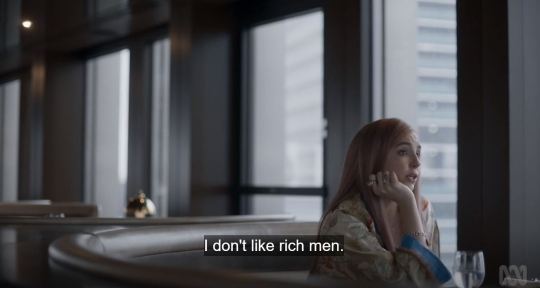
aaron, like villanelle, has up until this point mistaken them for exactly alike, but they’ve been miscommunicating all along. at lunch, villanelle said, “i dont like rich men” – meaning, i like women, specifically eve, and i have my own resources. aaron counters, “but you like money”. he’s misinterpreted, and thinks villanelle means, like him, that she never wants to have sex or talk with other humans. instead, he concludes that she likes the material object of money, and the subsequent ability to aquire items which might spark some kind of response – and this lines up with villanelle’s later remark about liking to buy and own things, which aaron recognises in himself. they’re replying to each other, but really, they’re having slightly different conversations. so what does this mean, overall? we’ve known forever that villanelle wants eve to be the person she “watches movies with”, but this conversation tells villanelle she could maybe be that person to eve, too. villanelle can “love” in her own unique way, can be present. and because eve’s stepping off the ledge and meeting her in the middle, neither of them will have to be anything other than who they actually are. and they can be who they actually are, together. this analysis got a lot more muddled than i wanted it to, because im a lil wine drunk after haning out with some friends, but i had Thoughts. i have many more Thoughts about the villaneve hookup, hugo, gemma’s death, why aaron is such a creepy villain, carolyn’s plans, etc. but i’ll leave it here for now. i hope this made some sense lmfao.
#killing eve#killing eve spoilers#ke analysis#villainever writes#ke#ke spoilers#villaneve#aaron peel#villanelle#villanelle x eve#eve x villanelle#killing eve 2x07#ke 2x07#killing eve season 2#killing eve s2#konstantin#villainever#killing eve analysis#villanevest writes
1K notes
·
View notes
Text
topic... ( my portrayal / reasoning of raven’s behavior in s6 / s7 && some things i would like to be done better );
season five
starting off at the end of s5, raven and shaw were turned in to mccreary’s crew by clarke and they were tortured. but most importantly mccreary was threatening to cut shaw’s legs off, because he was a pilot and didn’t need his legs to fly, in front of raven ( if i remember correctly ). that was very hard for her because while shaw may have not been a person she loved, she had started to care about him and now they were threatening him with something that raven had experienced. she knew what it was like to lose the mobility of your legs and it was something she wouldn’t let happen to shaw. so by the end of s5, raven is very mad at clarke for turning on them because it could have left shaw disabled.
season 6
going over to s6 raven wakes up to see a goodbye video of two people who she considers family. it hits her hard, to lose people she care about very much. but at the same time she saw the happy, she saw them in peace. i don’t know about you, but spending a lifetime with someone you love sounds pretty�� damn good to me. it does seem good to raven and maybe this time she’ll get it until they get to sanctum only to find shaw dead. she breaks at that, more than she shows. raven becomes tired of all the torturing, the killing, losing people she cares about but she never handles her emotions well.
so when they find the others, she does what she does best when she’s hurt. turn her emotions to anger towards clarke for turning on them in s5, to abby for hurting her and for hurting herself with the pills, to ryker for travelling across the universe only to find another planet where they kill innocent people to survive. jasper’s and later monty’s words stick to her by that point. they’ve both been her friends and she realizes that they’ve been right. and that they should do better. everytime you do something bad, you say you’re sorry and then you do it again. the cycle keeps going over and over again without stopping , no matter where they are.
however, she doesn’t express that in the same way that monty did , instead she’s more judgmental towards others in her attempt to make them do better resulting in having a rift in her relationships rather than advocating for them to do better. a small part of her does this intentionally, because firstly she lost monty & harper and later shaw, they thought clarke died and eventually towards the end abby died. that’s four people that raven ( & others ) lost and she’s putting up walls again and pushing them away because she can’t handle the grief, anymore.
jroth moved the role of people advocating / being tired of the violence from jasper to monty to raven, which could have been done some much better if after raven acted like this, they also had a taken her in the direction of admiting that she’s tired of losing people and she wants this violence to stop. it would be perfectly understandable in s5 if that had happened with raven and any member of the spacekru / or even abby when they started to ment their relationship. raven is a great choice to pass this trope onto for the later seasons because firstly she had spent a lot of time with jasper during s3/s4 when he was tired of the violence. she was the first ( besides monty ) to be with jasper while he grieved, while he searched for something more than violence and her storyline in s6/s7 could have mirrored that ( esp considering raven is again in a place of grieving ). also with monty it could have made sense on the matter of they probably spent a lot of time together in the ring and figuring out stuff together. she could have definetely kept the be the good guys part of his goodbye in her attempt of honoring him.
note: raven ( like the rest of spacekru ) spent 6 years in peace and by the moment she went aboard the eligius ship to get everyone back on earth , she got tortured multiple times in that season. so it’s very understandable that she doesn’t want to fight and hurt in the rest seasons.
season seven
now onto s7, they’re in a place were peace could be close if they all make it work. raven is back on a place of getting things done. it’s easy and she knows what to do. but the reactor suddenly malfuctions and in the span of a day she has to make a decision that costs four innocent lives. up until that point she’s done questionable things but she hasn’t killed anyone that wasn’t considered their enemy and threatened her life. she was in a similar spot in s4 were she denied the medicine to heal the radiation poisoning of the child from floukru but by murphy stealing that medicine, it confirmed that she was right. whether or not she’d taken the medicine, the child would die. now hatch and his people were killed by her. the reactor would have killed them anyway if they hand’t fixed it but as she said in the last episode, she could’ve done the job herself. she really thought in the beginning that they’d just be sick for a few days, so she didn’t risk herself and decided that it would be best to monitor and help emori from the chamber. by the time emori had gotten back and she could do fix the pipes, she now knew that going in would be a suicide mission. raven has always risked her life to save others but she never had a death wish and she wanted to stay alive.
that’s what completely broke her in s7. she’s wants to do better since the moment they stepped on sanctum. it’s why she makes sure jordan undestands that her killing those disciples was wrong. he’s the new blood of their people and she wants him to learn to do better than killing the enemy and that’s a big difference from raven in s1-s5. she never hesitated to harm the enemy if it meant saving the people she loves. but now when she was forced even in relative peace to kill innocent people, she breaks. raven didn’t want to harm hatch, she just tried to protect herself and she hates herself for that. she saw herself in nikki who was angry and hurt and attacked raven because in her spot she’d have done the same. in that moment, she didn’t realize that these kind of decisions are hard, she didn’t understand clarke. instead she realized that exactly how this cycle of violence is so fundamentally wrong and saving their own people doesn’t justify it , because the people they kill also have loved ones. and the cycle keeps going and hurting more and more people. where does it end ?
conclusion
what i really want to see is exactly this notion being said by raven. i would have loved for raven to speak more about it instead of having her judge everyone in season 6 although she had her reasons and it was her defense mechanism. she tried with murphy, telling him to chose morality over immortality and it was a good start but then they had her focused on getting shiedheda out of madi instead of speaking about it. i think the biggest problem is that t100 has too many storylines going on and in result with the limited screentime they are half done. instead raven’s storyline would have made more sense if she had time to speak with more people about this. instead she spent more time with ryker for no reason instead of being a part of the rest, and speaking with bellamy, for example, about it who also wanted to do better here. another thing is that they keep isolating characters with the different storylines and it doesn’t help. but generally i think that raven should have approached this storyline in her own way. she has lost so many people throughout the series and she can speak about wanting that to stop. everyone would understand why raven is tired of them losing people or hurting people because she knows first hand how it’s like to lose those close to you. this way it would have mirrored jasper’s storyline but still be a bit differently because jasper was tired of fighting / of hurting in general while raven doesn’t want to give up she just wants them to do better. and it would have been different from monty who found peace in harper and wanted them to live a better life together and raise their family in a better world. raven doesn’t have that stability but she wants to be able to find it , to live in peace for once in her life, and because that has elements from both jasper and monty could have made this storyline so much better and so much more interesting.
#( “ the youngest zero g mechanic in 52 years ” &. study ) ;#( “ here comes the sun ” &. ooc ) ;#blame this on kat who wanted to#hear my thoughts / what could have been done better
10 notes
·
View notes
Photo

K02: Revenge of the Mysterons from Mars
Like Invaders from the Deep, this movie is made out of four episodes of a TV series starring creepy puppets – in this case, the series is Captain Scarlet and the Mysterons and as far as I can tell from descriptions of it, it’s Stingray in Space. This does not inspire optimism. Furthermore, Revenge was presented as a sequel to a previous Captain Scarlet compilation movie, so I expect to have even less idea what the hell is going on.
The first episode that became part of the film is #19, Shadow of Fear. The organization Spectrum (which is pretty much Mighty Jack except they have a helicarrier instead of a submarine-jet) is trying to get a probe to Mars to spy on the shape-shifting Mysterons. They’re on the brink of success when one of their astronomers is revealed as a Mysteron agent, who has sabotaged their radio antenna! Then it’s #12, Lunarville 7, in which the Moon colony secedes from Earth and declares itself self-governing. Captain Scarlet and some of his colourful buddies then head to the Moon to ask them what’s going on up there. Naturally it’s a Mysteron plot. In #18, Crater 101, I am astonished to see they actually continue this storyline, as the characters go back to the Moon to do something about the base the Mysterons were building there. Then it’s time for #20, Dangerous Rendezvous, in which we finally get the backstory we really should have started out with.
The four episodes were a roller-coaster of emotions, although not in the ‘I laughed, I cried’ sort of way. My hopes started out at rock-bottom and Shadow of Fear did nothing to raise them – it was mostly people sitting at desks while timers ticked down. By the time the episode was over I was gritting my teeth, prepared for another hour and a half of this ordeal.
Lunarville 7 and Crater 101 turned out to be much better, though! Stuff actually happened in these episodes and the stories they told were connected. I began to hope that having sat through the tedium of Shadow of Fear, I would be rewarded with something approximating a satisfying conclusion. The final episode, unfortunately, is all over the place. It starts out looking like it’s going to be a Riding-With-Death-like tale of getting a scientist and his discovery to a secret destination. Then it’s suddenly about a Mysteron plot to destroy Spectrum’s helicarrier. Then it’s Backstory Time, and finally it’s about a booby trap. At the end, nothing is concluded really, Captain Scarlet’s vaunted indestructibility is never important, and neither the jet pilot ‘Angels’ nor the mysterious Captain Black ever do a damned thing.
(That may be an unfair statement – I watched the four episodes separately, and each one begins with the exposition about Captain Scarlet being bulletproof and introducing the characters, including the Angels and Captain Black. If the movie version never showed this, then I never would have noticed anything was missing. On the other hand, if they kept stuff like the bit where Colonel White explains the duties of the Angels to their guest, then I sure would have wondered why they never did anything.)
Even with my very limited experience of both, I can tell why Captain Scarlet is much more popular online than Stingray. There’s an attempt tell an overarching story, with every episode tying in to the main Mysteron threat even when the problems-of-the-week don’t have much to do with each other. The sets, props, and puppets are much better-made, and some of them are very entertaining in themselves – I’m a big fan of the bouncing MoonMobile, and the colourful Mysteron bases look like something out of Gamera vs Guiron. This extends to the puppets, which are much more realistic, but unfortunately don’t have a better range of motion than their Stingray counterparts. They look like Barbie and Ken dolls, and can move about as much.
The alien landscapes we see are very nice – the Moon looks appropriately desolate and gray, although I could almost hear Tom Servo having a fit about how the dust is behaving in what is supposedly a vacuum. There’s also a few bits of reasonably accurate space science. The lunar tractor getting stuck in the dust is a nice nod to something NASA worried quite a lot about in the 60’s. They had no idea what the actual properties of moon dust would be, and there was every reason to fear that any landing craft would just sink right into it and vanish. Revenge also notes and occasionally makes use of concepts like microgravity and speed-of-light transmission delays. The latter is a big plot point in Shadow of Fear, when the folks at Spectrum have to wait to find out if the Mysterons have destroyed their probe. This recalls the breathless moments at NASA that we see in National Geographic documentaries, when the technicians know a lander has either touched down or exploded half an hour ago but they won’t know until the signal arrives.
The most obvious place where they did something wrong science-wise was in using the exact same colour of dirt for scenes set on the Moon as for Mars. Quite a bit of Mars is dark basalt, but that’s not what you want to see in a movie. We hadn’t yet landed anything on Mars in 1967, but Mars has been the Red Planet since the dawn of time. You can see it’s red when you spot it in the sky, and it’s definitely orange through a telescope or even binoculars. In shots from space the Mars of Captain Scarlet is red, but on the surface it’s jarringly gray.
One way in which Captain Scarlet improves vastly on Stingray is that we never actually see a Mysteron who isn’t in human form. Where the various underwater humanoids of Stingray were just yellow people, the Mysterons are a faceless, threatening force, much like the Moon People of Twelve to the Moon. It makes them seem much more frightening and powerful. Furthermore, they have an actual motivation, although we have to wait until the very end to find out what it is. The first human mission to Mars fired a missile at one of their bases when the commander mistook a camera turret for a gun – hence the Mysterons want their titular revenge. It’s very simplistic, but it’s a hell of a lot better than ‘that’s just what aliens do.’
This makes the Mysterons into a slightly different manifestation of 60’s xenophobia than the various underwater peoples of Stingray were. The fact that their tactic is taking over people and infiltrating humanity already makes them an allegory for communists, and the dialogue takes this a little further by repeatedly referring to the situation as a ‘war of nerves’. Does that remind anybody else of the US and the USSR each waiting for the other to blink? There’s also an actual reason why Earth and Mars can’t reach a peaceful settlement – the Mysterons don’t want humanity’s apologies, they want our destruction. They cannot be reasoned with because they are not reasonable, at least by human standards. Their minds work in a fundamentally different way. Like the people who’ve been taken over by Beulah in It Conquered the World, once a Mysteron victim is infested, they must be destroyed.
Revenge of the Mysterons from Mars also did a much better job of choosing episodes to turn into a movie. The Shadow of Fear stuff is very much out of place, but the three episodes that follow are connected through the thread of the Mysteron outpost on the Moon and the ‘pulsator’ Captain Scarlet stole from it. The problem is that this story doesn’t actually resolve anything. The humans are in the exact same position at the end as they are at the beginning – they can’t talk to the Mysterons and can only carry on with being constantly on guard and terrified of infiltration. An evil plan has been thwarted but neither side has gained ground. Between that and the general lack of direction in Dangerous Rendezvous, it’s just frustrating.
That might still have been okay – there are plenty of war stories that are about a single battle won and lost, but those are stories in which we care about the characters and their relationships. Unfortunately, as in Invaders from the Deep, the characters have almost nothing to them. Captain Scarlet is brave and determined, and Captain Blue is slightly more cautious. Other than that, there’s not much to go on. We never see Scarlet and Blue in any context except their Spectrum work, so we don’t know if they’re actually friends. We never even find out their real names. Spectrum head Colonel White has even less to him than the guy in charge of Marineville, since the latter had a daughter he loved and an implied backstory in that he was an amputee. Lieutenant Green is sort of vaguely ethnic but not too ethnic, you don’t want to scare people. Lunar engineer Linda Nolan seems like she has a bit of a crush on Captain Scarlet, and he might reciprocate, but we never see her again.
In a lot of ways, Captain Scarlet and the Mysterons is an improvement on Stingray, but almost all those ways are a direct result of how much money they had available for the production. In terms of characterization, writing, and direction, all the same problems remain… except one. Where Stingray often seemed kind of lazy, Captain Scarlet definitely comes across as a project people cared about and wanted to make the best they possibly could. They didn’t succeed, or I wouldn’t be here talking about it, but I can give then points for trying.
17 notes
·
View notes
Note
I’m new to the Roswell New Mexico fandom and I have noticed people,you, don’t really like the creator Carina and I was wondering why.
Ooooh boy. Would you like those answers in alphabetical order, chronological order, order of egregiousness, or order of how much they piss me off?
I have a lot of issues with Carina, as do a lot of other people. Obviously, not everyone agrees with me, and some of my answers may be controversial (they’re the subject of biiiig debates in fandom). I have no intention of re-opening those debates, so what I write below is a summary of my opinions (many of which I know are shared by at least some others in fandom) for the purposes of answering your question. I’m also putting it all under a cut, because it’s a lot of negativity that some people may want to skip.
I mention a lot of tweets and interviews in the answer below; I, frankly, don’t want to go searching for and linking to each interview and tweet (and also, Carina has me blocked, for reasons I’ll get into), but everything below has a source that I can find if you super want to read it yourself.
So, here goes.
Firstly, Carina pisses me off because she is a white, straight woman who is writing about oppressed and marginalized minorities and, quite frankly, doing a bad job of it. She brags constantly about how progressive her show is, how much she wanted to include people of color and comment on things like immigration, how important the Malex storyline is to her, etc, etc, but doesn’t seem to be capable of (or care about) the delicacy, nuance, and care such issues require.
In a panel she did on Roswell (at ATX or NYCC, I think?) she talked about how she had qualms writing about marginalized people from identities she didn’t belong to; she said she was plagued by the question of “should I even be doing this?” Which she then immediately answered with, “but we’re doing it!” and that was that, and that seemed to me to be such a flippant way to answer the question. Like, you’re writing about people whose experiences you don’t share and your response isn’t “I’m going to do research and talk to people,” it’s “eh, I”m doing it anyway”?
Then there’s the fact that when it comes to representation, Roswell has done a really really shitty job, engaged in harmful tropes, and thrown its characters of color under the bus. Carina insists that she consults with a lot of advocacy groups when writing about the experiences of undocumented immigrants and Latina characters, and yet. Liz simply forgives Max in the span of two episodes, even though he covered up her sister’s murder and was responsible for subjecting her family to racially-motivated hate crimes for a decade. Max, a white man, at no point acknowledges his privilege; he just pouts and whines when she rejects him until the Latina who was fucked over by his use of privilege just...forgives him. It is, in my opinion, incredibly indelicate and kind of insulting. She made the south Asian man (the only Asian character on the show, in fact) the borderline pedophile serial killer who violated Isobel for years, was creepily grooming both Isobel and Rosa, and murdered a bunch of women. She made the only black woman on the show (Maria) the plot device for an entire season: Maria had no storyline. She was there to give information to Liz when Liz was solving Rosa’s murder. She hasn’t known about the aliens all season and was thus excluded from the major show narratives. Her one defining character trait (her loyalty to her friends) was completely thrown away in order to make her a plot device for Malex (because let’s face it, Miluca won’t last and Malex will get back together). Narratively, she was thrown under the bus.
And then there’s the queer representation, which...don’t get me started. She keeps talking about how much she loves Malex and how they’re her favorites, but she’s also very explicitly said that she finds happy relationships boring and that she uses fiction to work out her own trauma, which means that she’s essentially likely going to put the only same-sex ship on the show through an interminable amount of tragedy (because that’s what queer viewers absolutely need in this day and age).
Plus, the idea of a straight woman using a fictional same-sex relationship to work out her own issue makes me really, really uncomfortable, because she’s made it clear that she fundamentally doesn’t understand the queer experience. She says she consults with advocacy groups when she’s writing queer characters (she won’t actually name these LGBT advocacy groups, which doesn’t make me sideye her at all), but I have doubts about whether she listens to them. I mean, she said, after the season 1 finale aired, that Michael going to Maria has nothing to do with her being a woman, even though she also explicitly said Michael wants something “easy,” and a same-sex relationship in Roswell, as it’s presented in canon, can never be easy. Roswell is canonically a homophobic, bigoted town, and Malex’s trauma stems largely from homophobia. Their relationship issues stem (not entirely, but largely) from them being the victims of homophobic abuse and a homophobic hate crime. Being with Maria means Michael never has to worry about any of those things, and the fact that Carina doesn’t seem to conceive of this is mind-boggling to me.
Then there’s the fact that Maria...basically outed Michael to Liz, and this doesn’t seem to be a problem. Of course, maybe they’ll address it in season 2, I don’t know. But, Carina basically wrote a woman who has been best friends with a gay guy for more than a decade as casually outing someone (when she tells Liz that Michael is Museum Guy). The fact that this is a problem doesn’t seem to cross her mind for a second when she tells Liz, even though this is information Michael has never told her himself and they’ve known each other for a decade. It’s not something Carina’s ever mentioned in the numerous post-finale interviews she did. And frankly, it doesn’t matter who Maria outed Michael to; the fact that she’s capable of it when best friends with a gay guy in a town like Roswell, when Maria has been written as a loyal and understanding friend up to now, again suggests to me that Carina just does not comprehend the queer experience.
(Also, technically, all the Isobel/Rosa hints, then it turning out that actually Noah was possessing Isobel, screams queerbaiting to me)
And then there’s the mess that is the love triangle. I’m of the camp that things that it’s complete and utter bullshit that contributes to the stereotype of bisexual people as promiscuous, though I know there’s people who think it’s good representation. It shows that she’s more interested in her particular (and frankly, kind of esoteric) storytelling preferences more than she cares about representation or continuity. The love triangle is, frankly, really badly written, and nothing about Maria developing “feelings” for Michael (or him for her, honestly) is in any way believable. Maria getting with Michael behind Alex’s back requires throwing out Maria’s only character trait (her loyalty and commitment to being a good friend). But Carina ~has~ to have her love triangle, characterization or continuity be damned.
Speaking of storytelling, Carina is kind of...a bad writer. Look, I love the characters on Roswell, and I love the world she created, and it had some truly beautiful moments. But let’s just admit the season 1 plot was a mess. There were so many plot holes. Who knows what? Does Alex know Liz knows about aliens and vice versa? Does Alex know about Rosa, or just about aliens? Why did they spend episode 9 establishing that Alex is taking over project Sheppard to find the alien serial killer, only to have him be missing from the episode (1x11) where they find the alien serial killer? Does Alex know that it’s Noah? If Michael’s hand got broken right before he went to cover up Rosa’s murder, why did Liz think it couldn’t have been Michael “because his hand was broken then”? If Isobel is an event planner (a busy and demanding job) how did they manage to cover up her being missing for so many weeks? If Malex went straight from the museum to the toolshed, when did Alex have time to tell Maria about Museum Guy? What is Alex’s rank? (it changes from the pilot to the show). I could go on. Like, I just don’t have a lot of trust in the narrative going forward, in character and emotional continuity, in a fulfilling story for the characters I love, given that Carina seems to have a basic inability to so much as google (”my entropy changes”? that makes no sense), let alone write a story that makes sense.
Part of the reason she’s not a very good writer, though, is because she doesn’t seem to like criticism. She insists she listens to it from people who matter and whose judgment she trusts, but, um, the mess that is the narrative suggests otherwise to me. The fact that she wrote in the love triangle suggests otherwise; it screams to me that it’s something she just had to have, regardless of whether it made narrative sense. She also literally blocks fans on Twitter who give her any kind of criticism. I don’t mean hate and vitriol, I mean criticism. She complains about how she, a public figure, a showrunner with a show that has millions of viewers, wants to log in to twitter and only see positive things and have fun interactions with friends. And I get it, criticism can be exhausting. But her job is literally to bring viewers to the CW. It is to tell a good story, and, if she wants to be as woke and progressive as she insists she is, it is to listen to different people - including fans. If she wants to shoot the shit with friends on Twitter, maybe she should get a private account. But I personally believe that she can’t use queer and marginalized characters to work out her own trauma, with no understanding of those people’s experiences, and then demand that people only ever praise her for it. It reminds me of the debate about criticism in fic comments, actually: some fic writers don’t want any negative comments. Which is fine if you’re writing fic for fun. Carina’s a professional writer with a TV show, who is getting paid. Insulating herself from literally any and all objections from the audience she’s writing for is, in my opinion, stupid, and also incredibly self-centered if she’s writing about people who’s experiences she doesn’t share.
Honorable mentions, probably not worth getting into:
She has like, a really creepy crush on Michael Vlamis, and even though she’s technically his boss, she’s constantly basically...thirsting over him on Twitter and Instagram in very uncomfortable ways
Max’s little speech to Michael in 1x11 about how he felt “everything,” every part of the abuse Michael suffered, and how guilty he felt about it, was just absolutely horrifying and tone deaf. Max, a character with great privilege, basically making all of Michael’s abuse about himself and how guilty it made him feel and acting like he can in any way share or understand Michael’s experience was just in every way gross, but clearly intended to make Max ~compelling~ and get the brothers to start talking and become closer and it just again shows a complete misunderstanding of the experiences of people less fortunate than her.
Which, in short, all means that I have absolutely zero faith in Season 2. I’m not in the least bit excited for it. I think she’ll completely let us down, and I expect a lot more of the same tone-deafness and lack of nuance in relation to complex issues and marginalized characters. I think she’ll put us through the wringer, emotionally, for the sake of writing angst rather than telling a good story.
Anyway, hope that answered your question, anon.
16 notes
·
View notes
Text
Somewhat scattered reactions on rewatching “Kinda”
There's nothing subtle or terribly nuanced about the themes of this story but there's so much unsubtle stuff going on that it ends up rather dense. The central conflict is between ways of living that are aggressive, extractive, and seek to exert control over their environment on the one hand, and ways that are enlightened, collaborative, and harmonious with their environment on the other. This conflict instantiates itself over and over, and often on several levels at once in a given scene: between the colonial culture and the indigenous one, between individuals in each culture, between men and women, and within the psyches of the characters. The suggestion is that all of this is facilitated by the corrupting influence of the Mara, a "creature from the dark parts of the mind" who encourages violent, fearful, and selfish behaviour.
Binary gender essentialism is baked into the worldbuilding in surprising ways. Women in this story are fundamentally rational and clearsighted in a way that men are not. The colonial men are desperately violent, clinging to hierarchical authority and the trappings of their civilization to reassure them of their own ability to assert order on the world around them, ready to defend that order with truly disproportionate force. Even Adric, when he's piloting the mech suit, is a danger to those around him because his very fear of losing control causes the body he's in to lash out unpredictably (and then he flees from this knowledge, insisting to Tegan afterward that he had been getting the hang of it). By contrast, the Kinda men, and other men who have opened the Kinda box, seem to have peacefully surrendered control. They are placid, gentle, and kind, but they happily go along with the whims of whatever strong personalities are nearest; Kinda culture seems to rely on a situation in which the only such personalities will be the wise women, the only ones (in the ordinary way of things) who can be exposed to the Kinda collective experience and still retain an individual voice. On the other hand, when Todd the female scientist opens the box it doesn't seem to wreak any major changes on her personality or worldviews, and Panna the wise woman isn't surprised by this.
(As an aside, this is a story in which masculinity and British imperialism are treated very critically, but it doesn't do well by women or indigenous people either. Even though the script suggests that they're very advanced (and presumably as in North America the bountiful forests of the planet are the product of long and careful human cultivation), the Kinda as they appear on screen are, by and large, noble savage caricatures; meanwhile, the women characters mostly spend the story reacting to the men around then. The story's interest in femininity and indigeneity seems to be mainly in holding them up as an idealized contrast to the characters it takes as its main concern. At this point in the series' history, to my knowledge, we still have a year to go before we get a televised story not written by a white man.)
So what's going on with Tegan, then? The Mara is a transparent metaphor for feelings and tendencies of fear and aggression which are masculine-coded in the story, and itself seems to prefer to speak in the dream space in the form of a laughing and predatory young man. Tegan is the only woman we see who seems to fall prey to those feelings even briefly, and she goes so far as to be completely possessed by the Mara, one of only two characters to whom that happens (and the only one of those two that there's any sense of interiority for). Karuna later suggests that the reason that she was vulnerable was that she slept by the chimes alone, something that all the Kinda know they should never do. Tegan is isolated in part because her closest companion of the TARDIS crew, Nyssa, isn't really in this one (which presages "Enlightenment", another time she'll be menaced by a masculine figure the Doctor can't protect her from because he doesn't spot the danger). Even so, the fact that women must observe taboos to keep from welcoming in the Mara suggests that the story's gender essentialism needs more active shoring up behind the scenes, and is less just part of the fabric of the universe, than it would prefer to admit.
The other figure who troubles gender boundaries here is, obviously, the Doctor, who opens the box and experiences it as women do: a new piece of information, rather than an annihilation of his former self. This does startle Panna, who suggests that it must be because the Doctor is "an idiot." It's a jarring choice of words; one doesn't want to imagine that the Kinda, who are otherwise harmonious and enlightened and et cetera, go in for the quasi-eugenicism of insulting people for being mentally deficient or unfit. There's also the question of what it is about men she calls idiots that makes them immune to the effects of the box. One headcanon I like is that what we're hearing is a sort of mistranslation or equivocation, that by "idiot" she really means "fool," like the capering clown figure we see entertaining the Kinda and mirroring their emotions to defuse moments of stress: someone playfully open to the world, someone who doesn't take himself seriously. This is able to nicely parallel the way that the Twelfth Doctor will much later use the same word, declaring himself an "idiot with a box" as part of a deliberate turning away from his series 8 tendencies to try to control and manage everyone around him, from the accusation of trying to be "an officer" in a violent hierarchy like the colonial men in this story.
I'm pretty sure this was the first serial in which I ever saw the Fifth Doctor, and I was immediately really taken with him. He seemed to be thoughtful about other people in ways that I wasn't used to from the Doctor, and he's still one of my favourites of the classic series. Watching this time, I was struck how much of what I liked was in his performance rather than the writing. Davison acts the Doctor as someone warm, unassuming, understated, a little bit anxious, more interested in hearing about you than talking about himself; the Doctor is written here as someone who doesn't listen to his companions but is quick to berate them when something goes wrong, who is frequently frustrated to know more than the people around him and not be able to find the ways to explain so that they'll shut up and do as he says for once. This is, as I recall, a tension that will continue in his Doctor going forward. My immediate and intuitive reading of it on that first encounter was that he was someone who was consciously trying, though he was very unused to it, to put down his power and approach other people open-handed; I wonder how much of that sense was influenced by the context of this story happening around him.
8 notes
·
View notes
Text

Alright! He's finally here and mine :madlaugh: I can't believe how hard this was and how anxious I was about a fucking 3D model! That's what happens when you love to an extreme a secondary character from a videogame franchise. I can't thank her enough but KelluArts save my ass here and seriously, she's the absolute best!! And you're probably wondering "why was she anxious for? It's just a videogame character for God's sakes!" I know, I know it sounds ridiculous but still I had a lot of renders in mind with him since the dawn of my hobbyist existence, so this was a key element for me. He's the father of one of my OC's and the husband of another, so is kind of fundamental for me to have him and expand my own take on the RE's universe here with you guys. Just writing about him is not the same as doing renders with his face, for me was incomplete until last December when he was first shown.
With RE3 I have a "special" relationship if you can say that about the game. Is a good game but not better than the original. It had it's moments when it was but sadly as a whole the game was not superior at all. I'm still a huge lover from REmake, the one and only I consider a remake in this franchise and could never beat that milestone Capcom set in 2002. Sorry not sorry.
In another news I hope all of you stay safe inside with your families, and if you're alone I hope you get in contact with those you love. This wretched virus might dominated our current lives but it wouldn't be forever, and sooner or later we will resume our normal lives again leaving these difficult times behind.
Now! Let's explain what you are seeing here! Ok I had a discussion with one of my good friends some weeks ago (while crying on her virtual shoulder because of this asshole) about what would be the best explanation visually and narrated for Brad's decision to stay behind Raccoon. This render is dedicated to her and her infinite patience with me and all my crazy ideas, even if this year looks awful for now she's one of the best thing ever happened to me in 2020. Thank you from the bottom of my heart and one day I'll make your render with Brad on top of you xD
Ok: the idea here was basically show his emotions and the contrast between life and death. The green, yellow, red and orange represent the "life" side, in which he had his family, friends and distant relatives too. At his back I played a little bit with a white lamp to represent his religious side, because he's the son of an Italian immigrant and all the religious connotations it represents. Resurrection, pureness, peace and all those significances. On the opposite side of "life" we have his fate: death. Represented with cold colors as blue, light blue and purple is what was waiting for him after he decided to stay for Jill. His face is turned to his left facing the idea of trying to help other fellow citizens and his co-worker because he wanted something: redemption.
That's the title of this render: redemption. Why? Because he felt the survivor's guilt of surviving back in July. He knows he did what pilots do: he followed the right protocol. He left to look for help. Had he stayed, the whole team's survival would have been zero. He returned and throwed you the rocket launcher (a team like STARS should have fast roped in, in the first place. Not to mention, had he stayed on the ground, he would have likely been killed like Bravos Pilot and everybody would have been fucked). But still, even if he knows it and his wife mentioned a hundred times to lift that guilt from his shoulders, he felt like he was in debt with his team. I have a lot to write about this and a confrontation with Chris when they arrived the RPD after the incident, and I think I'll make another render, so I'll explain better in the near future.
This happened during the middle of the night, days before Emily's departure from RC with Chelsea. He was overwhelmed by this situation and his own marital situation (a lot of arguments because he decided to stay, harsh words from his wife telling him "you don't deserve the daughter you have, you don't deserve her at all" or "we suffered a lot to finally have her and still you want to throw it all away. You're an asshole, Brad! That's what you are!". Brad felt the need of telling his own little girl of just days of age why he chooses that path, why he would probably die in RC and never get the chance of being with her. The effects on the notebook are an extract of a beta stage of what I had written about, still is blurred just for the fact I might have to change some of it in the future.
The portraits at the back are just for decoration with old renders I made during these years. Nothing special (wall was empty, so I decided to add those and a plant. Yes, a fucking plant xD) to be honest. Well at least for now nothing more to add with this render, I have another already scheduled to publish. Nevertheless, I'll try to post it next week or maybe in two weeks, I haven't decided yet xD
Thanks for reading and I hope you like it!!
(Oh and I love how he was portrayed in this game. Characterwise RE3 is really good (most of the times at least).
S.T.A.R.S. Team (now and forever!)
#resident evil 3 remake#resident evil 3#photoshop#photoscape#wattpad#emmy024#brad vickers#brad#resident evil fanfiction#resident evil 3 nemesis#character#stars alpha team#starsalphateam#starsteam#stars team#blender 2.8#blender3dart#blendercycles#blender render#blender3d#re3 remake#re3#re3 fanart
4 notes
·
View notes
Text
The Heroine with a Thousand Faces
As the youngest member of #TeamPurpleLion, not only have I learned a lot in just the four months we’ve been working together, but I’ve explained a lot of what I’ve learned to others. Sometimes it’s about the history of Defender of the Universe and Beast King GoLion that @crystal-rebellion researched, sometimes it’s referencing @felixazrael‘s musical knowhow or @leakinghate‘s animation knowledge, and most recently, it’s leaning on @voltronisruiningmylife‘s expertise in how to break down and identify writing to provide corrections to those who see something in a show or article not working but can’t tell why. One big thing I learned since starting this crazy ride with my team is a massive hole in my college education on writing, which Felix filled in for me since we hit the ground running. Sure in my fantasy literature class we discussed Aesop and The Hobbit, and what the phrase “The Hero’s Journey” means and why it’s the monomyth, but there was one thing that my dear professor never taught us, although I’m sure she will in the future. Compared to Joseph Campbell’s heroic journey, this other monomyth is much younger.
What is it, you may ask?
Simply put, it’s a heroine’s journey.

[Image description: Princess Allura with her hair up and wearing her flightsuit from season 1 “The Rise of Voltron” backlit by white light.]
Let’s go on an adventure together.
To understand the heroine’s journey, I want to give you all a rundown on what exactly the hero’s journey is first. While it was never neatly labeled as “The Hero’s Journey” until Campbell, studies on common themes and plot points began back in the 1870’s. As time moved forward, Campbell published his 17 steps to the monomyth in 1949 (The Hero with a Thousand Faces) and as we move toward the present his monomyth is eventually dubbed as “the hero’s journey”. I won’t overload you with the dates and stuff I needed to study since that’s a) not the point of this piece and b) Campbell’s monomyth is actually secondary to the main one in Voltron: Legendary Defender. That said, it’s the backbone of a lot of literature both old and new, and while not every story follows these 17 steps outlined by Campbell or approaches them in the same order, you’ll find everything from the story of Christ to Lord of the Rings somewhere in these steps. It’s just that a lot of times the steps of the hero’s journey aren’t ever really explained, so you as a reader/viewer/consumer will see them and will have a gut instinct as to what’s supposed to happen, and when it happens you feel great! The story followed a formula that satisfies its audience! But it also makes a story that doesn’t follow a formula feel fundamentally wrong, from just a mild discomfort like putting on a shirt and buttoning it slightly off, all the way to triggering strong emotional responses including panic attacks or tears. Stories are designed to bring forth emotions from their audience, but what good is a tragedy without a lesson to learn? How can we enjoy an empty marriage when the couple has no chemistry?
So with this piece, I hope to illuminate just what the steps of the heroine’s journey are, contrast them against the hero’s journey, where VLD fits into all of this, and through that demonstrate why they are not interchangeable even though they share similar names.
Part I: Of Heroes and Heroines
In The Hero With a Thousand Faces, Joseph Campbell outlines seventeen steps, which are laid out in this diagram by Reg Harris:
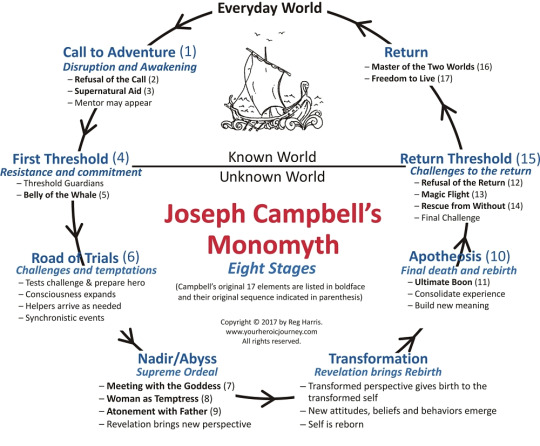
[Image description: diagram of The Hero’s Journey using a circular diagram shape separating out the seventeen steps into eight categories, divided into the Known World and the Unknown World.]
In Maureen Murdock’s The Heroine’s Journey, she writes the heroine’s journey as follows:

[Image description: The Heroine’s Journey depicting a cyclical diagram of the narrative, featuring 10 distinct steps that loop back to the beginning at the top.]
The Heroine’s Journey is fundamentally cyclical in nature, and while the diagram above shows the Hero’s Journey as a circle as well, it ultimately has finite start and end points. One of the key differences between these is that the Hero’s Journey explores internal character in an external adventure and the hero achieves a (theoretically) lasting peace once their journey is finished. Conversely, the heroine must constantly evaluate themselves in the bigoted environment that tries to disenfranchise them.
As a note, while I use gendered terms such as “hero” and “heroine”, I use them as gender-neutral placeholders to label which monomyth I’m speaking about at present. Women can undertake a hero’s journey, and men can undertake a heroine’s journey, particularly when you examine them in an intersectional lens.
A heroine’s journey, at its heart, is an examination and acceptance of the self in an unaccepting environment, and its cyclical nature stems from the fact that whenever a heroine moves into a new environment, they have to make that journey over and over. They can be a queer man of color, a white stay-at-home mom, a disabled nonbinary person, whatever the case, the constant need to re-evaluate their place in the world is what marks the heroine’s journey as separate from the hero’s journey.
But while it’s cyclical in nature, we should start at the beginning nonetheless.

[Image description: Alfor (right) holding Allura (left) in the Castle of Lions. She says, “We can’t give up hope!” and he replies, “I’m sorry, daughter.”]
In The Heroine’s Journey, the story begins when an event causes the heroine to separate from the feminine. A significant event spurs them to reject the prescribed role of the patriarchy, which in the case of a woman could be a mother, a damsel in distress, a wife, etc. The heroine is put into a box and chafes against its edges because it cuts them off from their ability to reach for the masculine, the power and privilege it affords. This marks a stark difference from how our archetypal hero lives and begins their own adventure. The hero lives a fairly mundane life for the brief time we see them before the first element comes into play: the Call to Adventure. This is generally an external force spurring the hero to action, as opposed to the internal force of the heroine.
The hero then will Refuse the Call and will be introduced to the Mentor they will come to rely upon, whereas the heroine typically immediately begins on a journey to become more powerful/masculine, generally through rejecting femininity. Princess Allura does not inherently reject her own femininity. She rejects the helplessness of being forced into cryostasis after her people have been destroyed and embarks on embracing her masculinity by finishing the war her father and Zarkon started 10,000 years ago. The heroine Identifies with the Masculine and Gathers Allies, which we see Allura do in the pilot of season 1 of VLD. She awakens to find a team of five men and her male adviser Coran, her allies in the coming intergalactic war, and she takes up the metaphorical lion herself as the pilot to the Castle of Lions, changing into her armor--pink, to honor the fallen--for the fight against Sendak as he tries to claim the Lions of Voltron for Emperor Zarkon. Her choice of pink, particularly pale pink, is reminiscent of the breast cancer awareness ribbon, baby pink, it is an intrinsically female color that she dons to assume the role of her father, King Alfor. The narrative is reminding the audience that Princess Allura--the first nonwhite Allura, no less--is just as much a princess as her previous white and blonde iterations are warriors.
After choosing their allies and undertaking this quest of gaining power (not to be confused with empowerment, our heroine is still operating within the confines of the patriarchy here), our heroine undergoes trials and faces enemies that try to persuade them back into the box, into what’s known and fundamentally safe and silencing. The words may be kind, be delivered kindly, but ultimately they can be boiled down to a single message: “go back to where you belong.” For the hero this is a point of no return as an external journey. The hero can choose to go home and leave saving the world to someone else, or they can choose to face the trials that bar them from their prize. But the heroine? They can’t. There is nobody who can save the heroine’s world because for them because their world is what they are trying to escape, and often they are the prize for a hero. It’s up to them to save themselves, and at this point in time, adopting the masculine and the power of the father figure is the way to go. And it works. Princess Allura, again while she does not get discouraged by the men around her to remain an idle princess, because this is the 21st goddamn century, her conflict arises from inexperience. King Alfor supports her drive to finish the war and take decisive action, to finish what he started. The Paladins challenge her authority as a sovereign in the beginning because even if she’s a princess by birth, she has no planet and they’re not of her planet or species anyway, and until they themselves undergo trials in the first few episodes do they appreciate that Allura is still critical as a person, despite her lack of sovereign weight.
Together, she and her team move through the obstacles and the war against Zarkon together, while simultaneously trying to build a coalition of allies to aid in the fight. In fact, much of the plot of VLD takes place during this stage of the heroine’s journey, and it’s here where we as the audience follow Allura as she meets her animus in the form of a Shadow figure: the cunning Prince Lotor. He takes on the role of the challenger to force Allura to better herself, and as Allura rises to the occasion each time, he is textually impressed by her battle skill, then by her intellect. The most iconic moment of Lotor as a Shadow (aka: the half of herself that Allura doesn’t want to accept yet), is when he baits Voltron into battle, then pilots his cruiser through the volatile environment of Thayserix. He expresses disappointment at Voltron’s ability in battle, but when Allura in Blue rises to meet the challenge he lays out, he praises her, even if he textually does not realize who is in Blue at the time.
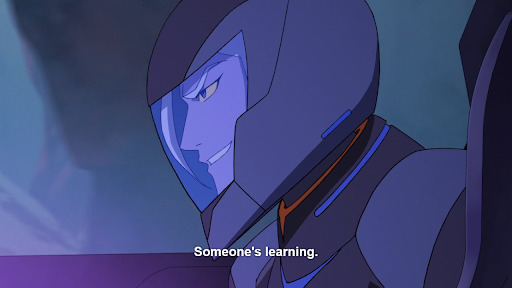
[Image description: Prince Lotor in profile, a pleased expression on his face, and the subtitles read “Someone’s learning.”]
As a brief aside: the animus comes from Jung and is often paired with an anima, or masculine and feminine energies. The key takeaway is that these energies are complementary to each other and exist in a balance. While they typically are portrayed in a more heterosexual context, like everything else in this meta, the terms are used in a gender-neutral context when not applied directly to Allura’s storyline. While Lotor could be likened to either Meeting the Goddess or (Wo)Man as Temptress in the hero’s journey, a key difference between the heroine’s journey animus and either of these feminized roles is that the Goddess and Temptress are two separate figures--generally women to male heroes--and are generally not equal to the hero physically or mentally. The animus, however, is intrinsically the perfect match to the anima of the heroine, being their complement and their intellectual and physical equal. Lotor is not meant to be seen as the woman on Indiana Jones’ arm, he’s meant to be a force in his own right, challenging Allura to better herself and raise the standards for them both. It’s fitting that this occurs in an episode full of fog and a dangerous abyss, because the traditional hero descends into a metaphorical (or literal) one to encounter these flattened versions of feminine energy.
The trials continue for Allura through the seasons, and she makes many allies and continues to face their enemies head-on, and once Prince Lotor, now Emperor, cements his place as one of Allura’s allies he shifts from the Shadow figure challenging her to the animus in full, being encouraging and supportive as they work together as allies to find Oriande, a mythical place that should yield them the secrets of unlimited Quintessence. While Lotor challenges Allura in a traditionally masculine way (physical trials, battle, strategy), he also encourages her in a decidedly feminine way through Altean history and mythology, as Altea is very feminine-coded compared to the Galra Empire, which through Zarkon represents a familiar and violent strain of masculinity that seeks to crush Allura and force the universe to fit his will through abusive language and physical violence and genocide. Allura taking up the battle in Alfor’s place is simply her continuing the cycle and seeing power in masculine terms, rather than breaking the cycle.
Now here is where the diagrams diverge even further. Until this point, the journeys followed fairly similar trajectories. After the trials and battles of the heroine’s journey, they experience the boon of the journey, which the hero does not achieve until they face further trials and temptations. As such, we will continue to follow the heroine’s journey model and I’ll explain the significance of the flip.
Part II: Not the Place to Arrive
One of the significant things about the heroine’s journey is that when a woman undertakes it, it’s empowering and her becoming her most unified self. Campbell once reportedly said to Murdock, “Women don’t need to make the journey. In the whole mythological journey, the woman is there. All she has to do is realize that she’s the place that people are trying to get to.” In the hero’s journey, often a woman’s place is as the prize, rarely is she her own agent. As I stated previously, the hero and heroine journeys do not have to ascribe to gendered protagonists, however the reality is that the hero’s journey is very patriarchal in nature since it was formulated primarily through the study of male heroes and does not take into account the constant reassessment heroines must face. For heroes, they simply must survive going from point A to point B. Heroines are always subjected to reevaluation within their environment and the people around them, so their journey never really ends.
All this is to say that the hero receives their boon at the end of their story and that’s the end of it. They get a happily ever after and can return to normal life and spread their bounty to those in need or dearest to them.
The heroines?
They get their boon at the middle of the story.
And there’s still more to come for our heroine as they build toward the climax (pun intended).
Princess Allura receives the boon of Oriande’s secrets with Lotor by her side, which in pretty much every literature class would become a discussion on the ways this represents sex, or the the ways Allura is interacting with the world in terms of gender, particularly how they discover Oriande after having an emotional reaction in Haggar’s lab and activating the Altean compass stone. In the heroine’s journey, this boon is often of the same significance as the hero’s boon/reward at the end of their journey, but for the heroine it’s false. It’s fleeting. It’s not meant to last. This is the turning point for our heroine because while yes, our heroine achieved the goal of the adventure, they did so by consciously or unconsciously shunning the feminine. In Allura’s case, she’s still taking after her father, trying to follow in his--and to an extent Zarkon’s--footsteps by mastering the unlimited Quintessence.
And true to form, before season 6 is out, our heroine seems to be betrayed by her animus, returning him to the status of Shadow figure as he challenges her to unleash the power within one final time. Princess Allura thinks Lotor lied to her and has been harvesting Alteans for their Quintessence when Keith and his mother Krolia discover a living Altean in the Quantum Abyss, and with the budding on-screen romance between Allura and Lotor, this betrayal cuts our heroine deep. To her, he not only lied about there being no more Alteans left, but he actively continued the genocide his father began 10,000 years ago. That’s not an easy thing to get over. So Lotor assembles Sincline, which bears a visual resemblance to a wingless dragon--the last metaphorical dragon she faces before moving into the next step of the heroine’s journey--and with Allura in Voltron the two battle it out in a tragic action-packed scene that leads to Voltron overloading Lotor with Quintessence and leaving him in the Rift.
With the dragon defeated and the boon lost, the heroine has to sacrifice not only her animus, but the last vestiges of her home to try and undo what following the masculine has done: close not only the original Rift, but all the fractures in reality caused by their battle.
And what does a girl who has already lost her planet, people, and lover have left to lose?
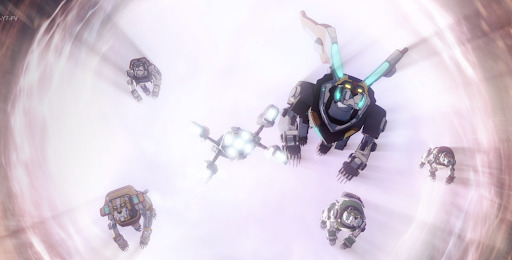
[Image description: The five Lions of Voltron flying away from the massive Rift, the Castle of Lions flying straight toward the center of it.]
The heroine following the footsteps of the masculine always comes at a major cost to them. In Allura’s case, she has to sacrifice her castle in order to make right the harm done to the literal universe. In this case, she mirrors Zarkon in his destruction of the universe, but rather than directly harming billions of lives on uncounted planets, she creates a literal hole in the universe because of her blindness to the consequences of the actions of herself and those around her.
And much like her father sending away the Lions, she must send away her castle in the hopes of saving the universe from greater destruction.
Part III: Transcending the Rift
From the gain and loss of the boon, things look dire for the heroine at this stage in the journey. In Allura’s case, she is without people, without planet, without castle, and as she learns at the beginning of season 8, her found family has families of their own--other than Coran, that is. Our heroine continues to lose pieces of the things and people surrounding her at the beginning of the story: which Murdock refers to as awakening feelings of spiritual aridity or death. She is losing her place in the universe even faster than before, when she stood on the shoulders of her father, and she must move forward. Allura passed the point of no return all the way back in season 1 episode 1. As the heroine, she broke free of the safe mold she knew for the past 10,000 years, and every episode since her awakening she has had to try to forge forward on the path she knew: that of her father. Now, though, her father’s methods have failed her, just as they failed him, leaving her with no option but to keep moving forward and to approach her journey from another angle.
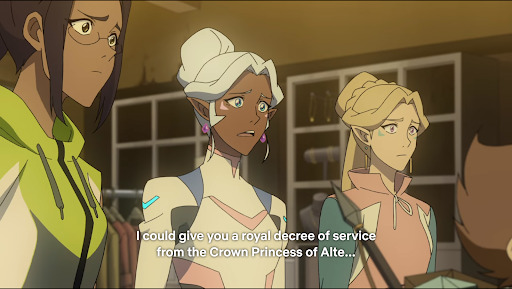
[Image description: from left to right, Veronica, Allura, Romelle, and Pidge (mostly off-screen) in a clothing swap shop as Allura speaks. Caption reads, “I could give you a royal decree of service from the Crown Princess of Alte…”]
Allura not only must deal with the loss of her place in the universe, but she must also deal with the fact that by leaving Lotor in the Rift, she abandons half of herself as well. Physically she is a whole person, but if we look at her role as an anima and what her fears and strengths are, destroying her animus throws her self-knowledge out of alignment. She’s careening away from the safe path of her father, but she must now rediscover the strengths within herself without succumbing to her weaknesses and do so by stepping out of her father’s shadow.
Season 8 is rife with emotional buildup and no payoff. We as the audience don’t know what happened to Lotor for the whole of season 7 and we see Allura struggling to deal with all her losses, we travel to Earth and meet the MFE pilots, a plucky bunch who probably were meant to lay groundwork for a new Vehicle Voltron, and we see that Haggar/Honerva is the final big bad of the whole show, ready to vindicate the son she lost to the Rift, but also 10,000 years ago when he was born and she became the Witch we love to hate. So when we join Allura and the gang on Earth with Luca in the infirmary, and Allura’s final trials begin…
Or they should have.
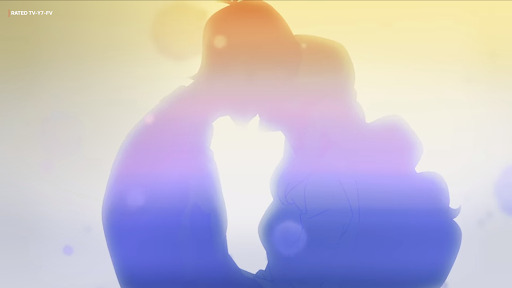
[Image description: Lance and Allura kissing in rainbow lighting where they are artificially-colored in red, then pink, then blue from top to bottom in front of a fading background of warm yellow at the top to gray at the bottom.]
Instead, we are treated to the final acts of a hero’s journey, but still following our heroine through the steps.
Our heroine wears down to the persistence of Lance, who in a heroic journey would receive a fair princess as his boon, and Allura is trying to find a place to belong. In seasons prior to this, Lance acts like a goofy everyday guy, very much a typical character in many present-day stories that allows the audience to see themselves in him. He fantasizes about wooing the princess, calls himself a ladies’ man, tries to be funny, he’s a pretty typical character that a male audience is more likely to sympathize with, and as such the fantasy is pairing up with the prettiest, smartest, etc. girl in the story. The woman as a boon, the Goddess, and the Temptress are never on equal footing with the male hero, and even in the case of female heroes, the meeting with a god(dess) means that the female hero is worthy of being a consort rather than the equal that a heroine is to the anima/animus. In fact, Campbell reportedly told Murdock, “Women don’t need to make the journey. In the whole mythological journey, the woman is there. All she has to do is realize that she’s the place that people are trying to get to.” In the hero’s journey, if the hero is male and heterosexual, the women will always be the prize, the virginal ideal, or the sexualized damnation, and in all of them, the woman is meant to be receptive to the man (and doesn’t THAT sound like some familiar rhetoric). Never is the woman an agent in the hero’s journey when it fulfills a male fantasy. And it is this very same box that spurs a heroine to begin their heroine’s journey: this breakdown of people to individual parts as determined by a patriarchal society.
While Lance is a hero in his own right, in Allura’s heroine journey, he acts as an ogre that comes dressed as a male ally all the way back in season 1. He’s a Subverted Nice Guy in that he’s constantly trying to woo Allura, but ultimately he’s still reinforcing the same patriarchy that not only plagues Allura in this iteration, but also in previous iterations of the Voltron franchise. The Nice Guy doesn’t challenge the heroine like the animus, but rather encourages them to stay in place or to fit a predetermined mold once more.
Look familiar?

[Image description: Lance’s fantasy, with him standing triumphant over Zarkon as the team cheers him on, Allura kneeling at his right side and looking up at him, while a flag with his face waves on his left.]
Many of the silly shots in the series have been foreshadowing, whether in the most direct sense or in the promise of subverting what’s portrayed. In the case of this screenshot, by the time Lance gets the girl, Zarkon is killed (by Lotor), Allura has already had an intimate relationship (with Lotor), and the team collectively became heroes and allies of Lotor before the end of season 6 happened. Lance, textually, is not Allura’s equal as an animus, and while he doesn’t quite view her as his equal--especially in earlier seasons--he can only textually become her equal when she is at her lowest point, and he’s still affixed to the idea that she’s a prize, going so far as to say that “winning prizes is my specialty” in “Clear Day”. Really, it’s a messy relationship dynamic that tries to show the audience why, as they stand in the canon material, they don’t work. Not only is Allura still not his equal, but his fantasy comes about at the hands of others, or with the help of others, and he comes second. He plays a role, but he is not the singular hero he once fantasized about being. Textually this subversion is teaching him a lesson about becoming his best self and acknowledging that he doesn’t have to be the hero, the payoff of which should have come in season 8 as Allura completes her heroine’s journey to become her most unified and realized self. It’s meant to be his apotheosis, the new perspective and enlightenment brought to the hero after facing all the trials of the journey as a part of the final reward.
Allura, fighting with this sudden loss of herself, must now also help spearhead the war against Honerva, the archetypal Bad Mother, in an alchemist-versus-alchemist battle for not only Lotor’s physical soul but for Allura’s metaphorical one as well. This is a new fight, the gauntlet thrown by someone other than her animus, and after all his tests, she must still rise to the challenge with the same energy, but she must do so with new knowledge now that she knows she cannot rely solely on her father.
But what’s the next step for a heroine trapped in the arid desert of the unknown self and with the weight of the world pressing onto them?
They must descend to the underworld and begin the transformation from the masculine methods to unleash the femininity that’s been locked away this whole time.
And who do we have to escort Allura to the metaphorical underworld as she falls asleep?
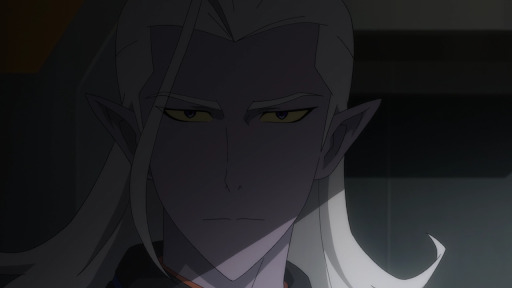
[Image description: A close-up of Lotor’s face in deep shadows as he stares head-on at the “camera”.]
Her Animus, acting as a Shadow once more.
His entrance is littered with sex. Not literally, but metaphorically. He greets Allura while she’s in bed, the camera does a gratuitous slow pan over his body in a way that many cameras exclusively afford to women, the presence of a blooming flower with an erect stamen, the lighting of the preview--altered in the final season itself--is purple even, a romantic and spiritual color. You know the joke in college English classes about how everything is sex except sex? That’s this scene in a nutshell. He’s always been drawn and behaved in a way designed to appeal to the female gaze (an essay in itself), but this scene really takes the cake.

[Image description: Lotor as viewed in profile from a low angle in a Garrison room, looking down at a juniberry flower in a pot.]
And it’s this scene where we see Lotor give Allura the first critical piece of information for how she can stop Honerva/Haggar, but also reminding her that some people do not change. While Allura must change to achieve her realization, he reminds her that Haggar is still the same witch, and that her pain of losing Lotor becoming public does not excuse the fact that she has not expressed remorse or tried to change herself, let alone her hand in not only his downfall but in the brainwashing of the Alteans. She is an antagonist so focused on the wrongs done to her that she justifies the wrongs she does to others with them. Allura, however, expressed remorse and wanted to save Lotor as soon as she realized what was going on, which further cements the ways in which their fates could have been the same or switched had they made slightly different choices. Honerva is 10,000 years too late. Like Lotor mirrors his father and in “Shadows” is shown to be more empathetic, Allura mirrors Honerva and both prove throughout the show to have stronger moral compasses than their predecessors. They are the Emperor and Alchemist, and while fate decrees they must take up the mantle left behind, their free will dictates that they should not blindly follow their footsteps if they truly wish to make a lasting change. Narratively, they must forge a new path if they are to bring the universe to peace again.

[Image description: A close-up shot of the juniberry flower with Allura visible in the background, but blurred. The subtitle reads Lotor’s line, “The witch may change her name, but she will always be a witch.”]
Lotor tempts Allura to take the entity into herself, and when she reaches out to connect with it, she is taken further into the dreamscape and finds herself back on Altea and greeted by her mother. This marks the beginning of the reconnection with the feminine, but while Allura has always so desperately missed her family and Altea, she finds herself in a precarious position. Suddenly, she is in the very same mech suit that Luca was found in, and to save Altea from the Galra fleet overhead, she makes the decision to use the planet’s Quintessence. However, in the process of destroying the Galra fleet, destroys Altea as well. As her world crumbles, her mother congratulates her for a job well done. This presumably mirrors the dropped plot about the Altean Colony and the decisions Lotor would have been faced with, and after “Shadows” would lend both Allura and the audience a greater appreciation for the position he was in before he died.
And when she finally wakes?

[Image description: Allura sitting up in the Garrison bunk, looking at the mice, the juniberry dry and wilted in the foreground, blurry. The subtitle reads, “It was only a dream.”]
Our oh so sexual symbol is wilted, and Allura wakes up alone.
With the visual deflowering and this new revelation about the kinds of decisions those before her have had to make, Allura can begin reconnecting with the feminine in earnest without falling into the old placements she may have been subjected to at the beginning of the story. This would have continued further with Allura reconnecting with her animus in the missing episode @leakinghate titles “The Descent”, especially fitting as she continues her descent to her feminine roots as a heroine and to reconnect with her lost animus. Reconnecting and reconciling with him--and with the side of herself he represents--is critical to her achieving unity within herself and being able to face Honerva head-on.
Once the heroine has descended to the underworld, begun the reconnection to the feminine, and returned with new knowledge on their relationship to their emotional side and the aspects overshadowed by the masculine, they are ready to begin healing the mother/daughter split. This in essence is the heroine returning to the old knowledge she has cast aside when following the path of the masculine/father, but approaching it with a new understanding and perspective. Think of it as understanding why your parents enforced rules like “don’t run into traffic”. As a kid, the danger may not be obvious, but as an adult you’re able to look at the same situation, see over obstacles younger you might not have, and realize “oh shit, that’s a car”. That said, the heroine does not allow themselves to get put back into the same or even a different pre-prescribed role because they now have a greater understanding of the situation at hand.
In Allura’s case, this means revisiting the plan on how to take down Honerva, and realizing that she must pursue the course laid out by her trip to the underworld to not only save the universe, but awaken Lotor from being a robeast. Part of the conflict against this plan comes from the team, who see the entity she took within herself as dangerous. While that’s true, stopping the plan also prevents Allura from growing in strength to be able to fight Honerva. The power flowing within her that Lotor referred to back in season 6 is at her fingertips, and like his visit in “Clear Day” reminded her, she need only take it. During both parts of the “Knights of Light” episodes, Allura is confronted with shades of Honerva’s memories as they dive deeper, and it’s here that we as the audience and the cast are meant to learn what truly became of Lotor after he was imprisoned in the Rift, and it’s meant to be utterly jarring to everyone. Instead, with how the scenes were edited together during the post-production alterations, Hate aptly points out in “Seek Truth in Darkness” that Honerva promising vengeance and seeing Lotor’s corpse has next to no impact. Or rather, it does to the audience--a melted corpse isn’t exactly Y-7 appropriate--but the characters don’t really react to this revelation at all.
That said, it’s more than likely that Allura genuinely believes Lotor to be dead (as opposed to a sleeping prince), which would explain her aggressive reaction to seeing pre-Rift Zarkon, and we don’t see his reaction to learning what he did to his son, either. This would be a prime location for Zarkon to experience and express remorse for what his actions have done to his son, subverting the toxic masculinity narrative his character had been representing prior.
At the end of “Knights of Light Part 2”, Hate mentions that Allura would need to make another trip to the underworld to commune with Lotor and realize that no, he’s not dead, but also that she not only must defeat Honerva, she must do so in order to save Lotor and free everyone of the cycle of violence that began 10,000 years ago. This is the final descent she makes before she can heal the wounded masculine, both in herself, and Lotor directly.
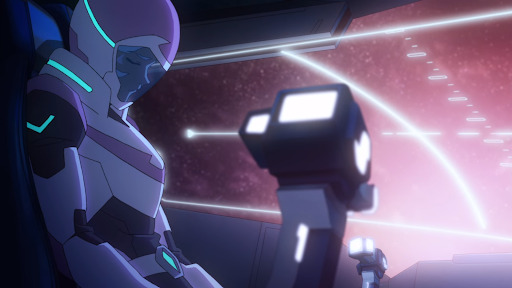
[Image description: Allura in profile inside the cockpit of Blue Lion, unconscious. Her window displays measurement increments and stars in red-tones, while Allura herself is lit in blue tones.]
After the end of this episode, however, Hate mentions that much of what was there is butchered in the post-production editing, so I will be extrapolating based on the content we have in the season as well as utilizing her analysis of the story as it should have been.
When Allura wakes up from falling unconscious, this is when we should see her proposing to save her animus, and it should come with a discussion with Lance about how they don’t click romantically. That said, in the version on Netflix, we see their relationship continue, however much of their shared body language doesn’t necessarily even match up with an awkward couple. Lance seems sullen and possessive, and while he might still be sullen in Allura’s original heroine’s journey, he would have had this moment of growth in which he learns to let go of Allura. She’s his fantasy, and not only is that unfair to Allura, it’s also unfair to him, and he doesn’t need to be the hero or the guy that gets the girl. He can be himself, silly, sharpshooting, video game-playing Lance. A genuinely nice dude, which completes the subversion of the Nice Guy trope his character embodied for so long.
“Uncharted Regions” is a hot mess of an episode in terms of narrative flow and consistency, but this would have marked the beginning of the alchemist vs. alchemist fight for not only Lotor’s soul, but the universe. Honerva uses the Sincline mech and her new mech to start tearing holes through realities, and once Allura jumps into the fray, that moves the audience into the next missing episode proposed by Hate: “Storming the Pyramid”. This would be where Honerva uses Allura to revive Lotor because she did not receive the life-givers’ blessing, and Allura would do it, literally healing the wounded masculine, but also falling right into Honerva’s trap in the process. This would almost certainly be a highly-controversial thing among Allura’s allies, but like Allura remaining on the path she knew, it’s easier to accept Lotor as pure evil who got what he deserved, when at no point is there a definite case against him. In fact, “Shadows” is designed to render him as a sympathetic character, and seeing his melted corpse is even more horrifying after seeing him as a baby and child. But that’s the way it is when a heroine breaks the mold. The heroine defines their own role, and as part of that, it gives them the ability to help others break theirs. The heroine experiences true empowerment by divorcing themselves from the power structures that defined them before, and doing so with the greater knowledge of their internal masculinity and femininity. Allura revisiting the war of her father with the lifegivers’ knowledge to compound her intrinsic alchemical abilities is the moment when she achieves union within herself, and it manifests physically as reviving Lotor, her animus.
It’s after this point that we see the Purple Lion and Purple Paladin manifest, our namesake.
In “Day 47”, Kolivan references the team sizes the Blades of Marmora use. He references four and five as the usual sizes, but six occasionally happening, but what he says next is particularly interesting.

[Image description: Kolivan being filmed for an interview, saying, “Seven seems rare, but… it could happen.”]
The Voltron team had four Paladins briefly after Shiro disappeared and before Allura took up the mantle, but the full team always has five. After Shiro returned for good, their team became six Paladins.
Now, with the healed animus Lotor on their side, they could have the rare seven-person configuration that Hate discusses at length in “Seek Truth in Darkness”.
With the anima and animus aligned together at last with no secrets, they can unify externally the same way Allura unified internally, and battle against Honerva properly. Now, Team V, Lotor, and the entire universe can face Honerva head-on and stand a chance at winning.
We also should get the emotional payoff for Lotor as an abuse victim in his own arc, closing up this nice little loose end that hurts way more than it did before season 8 dropped.

[Image description: An up-close shot of Lotor glaring into the “camera” in green lighting and saying to Haggar, “maybe I will take pity on you when the time comes.”]
And it’s worth mentioning that while the final battle is exciting and action-packed, the final surrender of Honerva comes quietly, in the rift of all realities. The characters of Team V are able to deliver their character-based arc lessons, it’s a somber moment of learning as Allura, using once more the blessing of the lifegivers, enlightens Honerva to her memories and what she’s done, but also restoring her sense of self the way Allura was. This is the final healing of the mother/daughter split, and it’s significant that Honerva’s abuse victim not be her healer. Not only does Lotor (as far as we know) lack the ability, but it’s never the victim’s job to heal their abuser, just as it’s not the obligation of the oppressed to appease their oppressor. Honerva can finally move on and begin atoning for what she did by setting the ghosts of the Paladins of old in her mind free, but that still begs the question of what our heroine and her animus must do to finish the job.
This is where Lotor would get his second chance, in the most literal sense of the term, where he faces a similar trial to the one in Oriande back in season 6 and the burning question for a man so concerned with survival and cunning.
Is there something he would give up the life he has known and fought so hard to keep for?
And this time, the answer is yes.
Allura.
It was always Allura.
While Honerva is able to stop the rift from expanding by, well, not expanding it herself, she lacks the ability to properly close it the way that it was closed the first time. It takes one final adventure, one final unification by the anima and animus, by the heroine and her Shadow, and one final goodbye. Allura and Lotor, born of an age long past, become the lifegivers eternal through staying behind to close the rift.
The lionhearted goddess of life and her stalwart champion of survival.
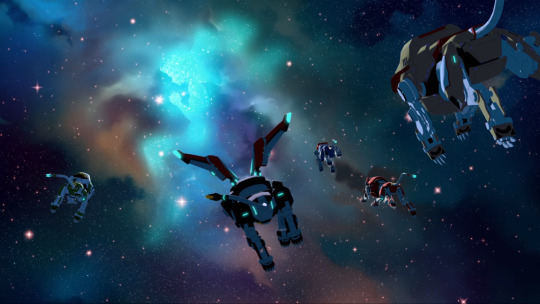
[Image description: The final scene after the credits, where an Allura-shaped nebula is nestled up against a smudged, darker nebula with a sea of stars among them, and the five Lions of Voltron flying toward the nebulae.]
Sources
Dos Santos, Joaquim and Montgomery, Lauren. Voltron: Legendary Defender. Netflix. 2016-2018.
LeakingHate. “Seek Truth in Darkness”. VLD Visuals Detective and Imperial ApologistTM. 2 Mar. 2019. https://leakinghate.tumblr.com/post/183160042843/seek-truth-in-darkness
“Maureen Murdock’s Heroine’s Journey Arc”. The Heroine Journeys Project. https://heroinejourneys.com/heroines-journey/
Murdock, Maureen. The Heroine’s Journey. 1990.
University of Kansas. “Science Fiction Writers Workshop: Joseph Campbell’s Hero’s Journey”. KU Guinn Center for the Study of Science Fiction. http://www.sfcenter.ku.edu/Workshop-stuff/Joseph-Campbell-Hero-Journey.htm
#dragon's ramblings#TeamPurpleLion#vld#the heroine's journey#voltron#allura#lotor#writing#literary analysis#strafe#hero's journey#lance#executive meddling#freevlds8#free vld s8
116 notes
·
View notes
Text
Getting inside Danny Williams’ brain, movie edition (“Partners” DVD extras)
For those of us who write fanfiction, one of the weird world-filling-in activities we sometimes have to do is try to come up with a comprehensive list of a character’s preferred leisure time activities. Sometimes they’ll give us hints on the show, but in most cases the show focuses far more on what they do at work than what they do during their off hours. Fanfiction, on the other hand, is often written about a character’s off hours, leaving us writers to gather clues and try to extrapolate from there.
Which is how I ended up having a very weird weekend trying to come up with a definitive list of movies I was certain Danny would really like. Because I honestly don’t think he’s a huge movie watcher (his go-to “crap there’s nothing on TV” option is usually sports of some kind) but he’s got too much movie knowledge not to appreciate the medium at least a little. Unlike Steve, Danny’s response to being forced through several different romance movies was to analyze them, deconstruct the various tropes, and learn to predict them in other movies. Casual viewers, in my experience, just don’t DO that.
Also, the one movie we know he loves, “Enemy Mine,” is a freakin’ classic.
The thing is, though, that it’s kind of a weird classic. For those who haven’t had the pleasure of experiencing the movie for themselves, “Enemy Mine” is a 1985 West German-American science fiction film starring Dennis Quaid and Louis Gossett, Jr. The two are pilots on opposite sides of an interstellar war, and they both crash land on the same planet. They hate each other, slowly become friends, and when Gossett’s character dies in childbirth (his species can reproduce all by themselves), Quaid’s character promises to take the kid back to Gossett’s home planet for a naming ceremony. He raises the kid for awhile, accidentally gets “rescued” and taken away from him, and steals a ship to get the kid back.
Unsurprisingly, the movie was a total box office bomb. That’s what tends to happen when a movie is really, really, good, but also completely fails to follow any conventional box office formula for success. If you boil it down to its bare essentials, “Enemy Mine” is about talking, aliens, and feelings. There’s a solid chunk of sci-fi fans who are fond of it, and count it AMONG their favorites, but it’s pretty rare for someone who isn’t a fan of sci-fi to like it. Let alone love it as much as Danny clearly does.
And Danny… there’s no way I’m buying a secret fondness for sci-fi. Someone in his life must have been a fan (I’m suspecting Matt, who I imagine must have been a big fan of escapism) but that man is so non-nerd he couldn’t casually come up with SUPERMAN when trying to put a name to his red-caped “costume” in the season 3 Halloween episode. I hadn’t even thought that was POSSIBLE. (He manages a reference much later in the series, but that’s after DC’s latest spate of movies. The marketing saturation was so dramatic at that point anyone who consumed even the most casual media couldn’t escape it).
Feelings, however… Danny’s a BIG fan of feelings. He was so openly moved when we saw him watch “Enemy Mine,” and he would ABSOLUTELY be one of those people who enjoyed sobbing over movies because he could never let himself cry in real life. Also, the man is a deeply emotional, deeply sentimental asshole, no matter how hard he tries to pretend he’s a tough guy. So if he’s going to seek out a movie on his own, it’s probably going to have to offer the same dialed-up-to-11 emotional catharsis that “Enemy Mine” does.
Also, he clearly doesn’t mind movies where the characters spend most of their time just talking to each other. Hell, he probably even loves it.
On that note, here’s a not-comprehensive-but-definitely-reliable list of some of Danny Williams’ most-watched movies, in no particular order.
Arrival
This one… Danny has to save this one for special occasions. The things the movie says about parenthood and consciously letting your heart get broken because of the sweetness along the way hits him right in the heart every single time, but there’s also a dead kid involved. Yes, she’s sort of at the edges, but we also get Amy Adams talking to her dead daughter in voiceover and it just wrecks Danny EVERY SINGLE TIME. Some of the things the movie says about choices and accepting pain also mess him up, but it touches on some deeper issues and he really doesn’t like to look at any of that too closely. It’s a beautiful, well-made movie (he WILL rant about how Adams deserved an Oscar for it), but sometimes he just can’t allow himself to get emotionally wrecked like that.
Steve only sort of understands why he gets so emotional over it. But every time they watch it together, he keeps his arms around Danny the entire time and doesn’t say a word about any tears he sees.
Beaches
Listen – I will physically fight anyone who tries to tell me this isn’t one of Clara Williams’ favorite movies. I am dead certain she watched this ALL THE TIME when Danny was growing up, and I’m sure he’s told several people that he suffered through it. But listen – lifelong friendship, massive weepiness, AND New Jersey? Danny loves this movie nearly as much as his mother does, and will absolutely watch it any time it happens to be on TV. He’s seen it so many times he can actually recite the lines of some of the big scenes along with the movie, but is careful not to let himself do that too often.
Steve absolutely teases him about this one, but if Grace catches him watching it she’ll sometimes sit down on the couch and watch it with him. Like her father, she also likes the movie far more than she’s willing to admit to, and is the one person Danny will actually let himself say the lines with (she does it with him). For the funeral scene and the bits after, Grace will inevitably get weepy and snuggle up close to her father.
Gifted
This one is just super obvious. In the movie, Chris Evans spends the entire movie figuring out how to raise his adorable super-gifted niece despite pressure from nearly everyone to give her up, and in between tries and fails to have some kind of dating life. It’s a celebration of the fathering spirit, and Danny relates HARD to it. It doesn’t get him as teary as some of the other ones, but there are enough emotional moments to leave him satisfied.
Up
Who DOESN’T cry during Carl and Ellie’s life together at the beginning of the movie? Danny found this one when Grace was still young enough that Disney made up a huge portion of her movie diet, but he’s stuck with it even though she hasn’t. He’s actually grown to like the movie more and more over the years, and what he hasn’t realized yet is because it’s really closely tied to the fact that he got dragged to Hawaii the year after the movie came out. The idea of a curmudgeon traveling to a hellish wilderness in the middle of nowhere and finding a family and new purpose in life when he gets there just started RESONATING with him for some reason, you know?
Bonus movie that Danny USED to watch all the time and now just can’t anymore: Ghost
Honestly, “Ghost” used to be one of his go-to movies. It’s got nearly the feels-per-minute ratio of “Beaches,” and is slightly less embarrassing for a grown man to be watching. Plus, Danny is a very intense, very specific kind of romantic, and the idea of a love that outlasted death appealed to him on a really fundamental level. Of course, he mentally classified as a fantasy, not so much because of the ghost as the idea that a married couple could actually love each other that much. But hey, who doesn’t enjoy a good fantasy now and then?
But after he and Steve got together… well, he’s TRIED to watch it in the years since. More than once, in fact. But it’s not long before he sees Patrick Swayze staying close to his wife, or trying to protect her from his murderous business partner, and thinking about how Steve would absolutely do that if he could manage it at all. Or he’ll see Demi Moore having such a tough time after her husband dies, and he can’t help but think about how destroyed he’d be if anything happened to Steve. If any of the close calls he’s had over the years were just a little bit closer. How easy it would be, even with Steve being more careful, for someone to shoot him one day.
Ever since then, he hasn’t ONCE managed to watch the movie all the way through. Eventually, he just stopped trying.
10 notes
·
View notes
Text
14.18 and 14.19 both will require additional viewings to fully understand the gravity of everything revealed, and context I think we’re only fully going to get in s15. Even now, after having seen 14.20, I have more questions than answers, I think. A big part of the reason for this is how much of the story focuses on how POV affects perception, and how easy it can be to manipulate actions based on that, combined with the effect of the weight of one’s own emotions on both perception and vulnerability to manipulation.
The story is screwing with everyone-- the characters AND us-- on a very meta level here.
Going through 14.18, from Cas’s grief and self-blame over not having told Sam, Dean, and Mary what he suspected about Jack being dangerous, to Dean’s transfer of blame to him because of the emotional weight conversation with Sam, because it calls back to Dean’s ENTIRE relationship with Jack, how his first reaction was “DIE” and that only gradually shifted into grudging acceptance through his grief and despair over losing Cas, into actual acceptance after Cas returned, into sympathy after Jack’s first mistake that led to the death of an innocent, into full familial acceptance by the time Dean says yes to Michael. In s14, Dean FINALLY feels a more parental sort of bonding with Jack, and as soon as he does, Jack sickens and dies. It’s almost like Dean has been manipulated into being prepared to make this ultimate sacrifice all along.
Their whole family is cursed. He’s poison, etc. etc.
This same perspective shift happens for Jack, being “guided” into believing that HE is somehow “poisoned” as well, that because of his actions the Winchesters will no longer trust him, but his vision of Lucifer convinces him that because of this, he can no longer trust them. Jack is so desperate to redeem himself in the eyes of the Winchesters that he’s convinced himself that what he’s doing is good.
How many layers of manipulation are going on here? The narrative spirals are turning so fast we’ve practically reached F5 tornado status here.
Dumah, in 14.19, finally has what she’s wanted since Jack was born. Apparently having locked Naomi away for having “failed” to defend Heaven from the incursion of the Empty Entity was nothing more than a pretense to use Jack for her own power play. Dumah truly believes she’s doing the right thing, because in times past, this perfectly lines up with what Heaven always did. Her version of a Heaven without mercy harks back to the mindset of angels during the Apocalypse era, of Michael and his mission to destroy worlds.
Jack TRULY BELIEVES that “purifying the world” and “making angels” out of human souls would please the Winchesters. The fact that he still willingly got in the Ma’lak box is the biggest demonstration of just how easily manipulated he is.
The way Dean’s been broken down to be prepared to believe that they have no other choice but to kill Jack, to sacrifice himself in the process, applies to everyone. It’s always been a manipulation, in the biggest way possible.
So that said, on to my questions:
1. Is Jack’s vision of Lucifer actually Chuck manipulating him, because heck that would be a nice turn from Lucifer pretending to be God to manipulate Sam back in s11. In the end, does it even really matter what the source of Jack’s visions are?
2. Did Jack actually cause Mary’s death, or did this force manipulate him into the power burst that killed her? Does that even really matter? Because it’s not about the act, but the perception of it. Because the perception of it is all that mattered to Jack, in the end. He rejected Mary’s perception of him as “not well.” He’s sadly following Donatello’s advice, with the “What Would The Winchesters Do.” But Jack’s own perception of what they would do is fundamentally flawed without his soul. Donatello replaced his missing empathy with the consideration of possibly the most morally kind man ever to live, a man who based all his choices and actions on how they might affect others. Kindness was Mr. Rogers’ mantra. Jack lacks the maturity to understand this, and instead has based his own actions on the results of his actions, and whether or not the Winchesters would approve, which is a distinctly different thing, and Jack lacks the mechanism to understand this. This is what makes him so terrifyingly dangerous now.
3. Everything that’s happened in s14 has brought TFW to this point where Chuck thought they would feel backed into this corner, where in the past they would be ready to accept Chuck’s terms for the conclusion of the story, the self-sacrifice, the terrible fate, as the absolute last resort solution to save the world. And at first it seems to work. At the beginning of 14.20, Dean seems ready to do the deed, because his perception isn’t just about Jack’s danger to the world, but also the fact that he feels at least indirectly responsible for what’s happened to Jack now.
Chuck’s first line when he finds Cas is, “Wow, you guys are screwed.” *smarmy smile* Cas calls him God, he objects, and is pleased when Cas calls him Chuck, because “Chuck” is a likable, personable dude, and God is a terrifying all powerful being. Perception, and manipulation.
DEAN: You know what I'm gonna say. SAM: Let me guess. This is where you tell me you're gonna pull the trigger. DEAN: Yeah, it is. We don't have a choice, Sam. SAM: Of course, we do. Don't we always? I mean, isn't that the point of everything we've ever done, that we always have a choice? DEAN: He killed our mom. SAM: I get it. I was mad, too. Or you know what? Hell, I'm still mad. And a part of me wants Jack dead -- it really does. But, Dean, we haven't even tried to save him. DEAN: S-- Okay. You heard him, right? He actually blamed Mom for what happened. SAM: He doesn't have a soul. DEAN: And whose fault is that? SAM: Mine. I'm the one who brought him back, and I brought him back because he's family. DEAN: Okay. SAM: And then he came back, and he burned his soul off to save us -- you and me. And now what? You... Now you -- you want my permission? You want me to say I'm cool with losing him and losing you all at once? 'Cause I can't do that. I won't say that, 'cause I... No. I've already lost too much.
It’s interesting that Jack’s visit with his grandmother is what begins to shift his perceptions of himself into understanding. She goes from demanding answers about “What did you do,” into “What are you?”
So I talked above how Dean and Jack’s stories are entwined, but this is where Cas and Jack’s stories are entwined-- through Jack’s desire to do good, to do the right thing and yet always somehow making things worse despite their best intentions. Mostly because they tried to do the right thing by their own POV and perception, without understanding how they were manipulated into it. Like Cas in s6 manipulated by Crowley, by Dean’s promise to Sam to go live a normal life away from hunting, feeling the burden to fix everything on his own and unable to see any other way because of the depth of lies being uncovered would lead to the disappointment that was what he truly feared all along.
Which is why at the final moment, what finally gives Dean pause in his conviction that Jack needs to die, is Jack’s understanding and acceptance, his willingness to face what he’d done and truly repent:
JACK: You're not gonna lock me up again, are you? DEAN: No. (Dean raises the gun, aims at Jack and exhales deeply. Jack kneels down and bows his head. Dean, looking puzzled, lowers the gun and walks closer towards Jack. When he’s right in front of Jack, he aims the gun directly at his head. At this moment Sam comes speeding into the cemetery, car tires screeching. He gets out of the car and starts running towards Dean and Jack) SAM: Dean? Dean! JACK:(to Dean) I understand. SAM: Dean, don't! Dean? Dean! JACK: I know what I've done. [...] JACK: And you were right all along. I am a monster.
And in the end, the fact that Jack understands is what makes Dean realize that there is still another way.
Because in this part of the story, this is where Sam’s parallel isn’t aligned to Jack’s, but to Chuck. Sam picks up the Equalizer gun and shoots both Chuck and himself with it.
Writers lie.
And this lie is Chuck’s downfall. Because he was never on their side.
All that talk of stopping an apocalyptic thing by killing Jack? And then he starts an apocalypse with a snap of his fingers? Yeah. But he’s shown his hand now, and this changes everything.
And can y’all even conceptualize how O_O it is to loop from that scene in the graveyard to Mary tucking in baby Sam in in the pilot episode? Because I am now suffering. Chuck did this. He did all of this.
#spn 14.18#spn 14.19#spn 14.20#spn 1.01#this is by far the worst loop ever :'d#spiders georg of the tnt loop#if you say 'mysterious ways' so help me i will kick your ass#lies and damn lies#it's spirals all the way down#well until the jumping off point we were left with in 14.20 anyway :p#s14 hellatus rewatch#it also makes me think even more that jack didn't kill mary but was manipulated into thinking he did#because killing mary is chuck's go-to move from the first cold open of his favorite series#it was amara... she of endings... who brought mary back as the thing they needed most#and chuck couldn't let that stand because he can't do endings#so he ditched amara and fridged mary again to keep his favorite story going#dude really really needs to get that his original story is just awful and let it go#and i'm actually at the point of waffling over whether mary will be back... because billie...
42 notes
·
View notes